

We believe: Why Catholics believe He is truly present Page 9



We believe: Why Catholics believe He is truly present Page 9
Following is the text of Archbishop Barry Hickey’s New Year message:
There are unmistakeable signs that the Christian West is in trouble. This is due partly to secularisation but even more to the fragmentation within and among Christian churches on matters of fundamental morality.
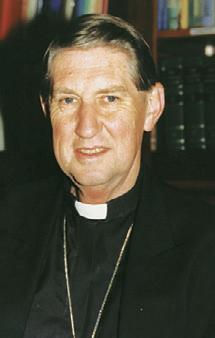
This scandalous division makes the churches appear uncertain and unreliable as guides to ethical behaviour. Church leaders are often challenged to be relevant in contemporary society by addressing the issues facing people and offering considered ethical advice.
What happens too often is that different leaders give different advice, often contradictory, leaving people uncertain and insecure.
Churches are divided on fundamental moral issues to do with human life and human sexuality, cloning, the use of human embryos to produce stem cells and perhaps the most shocking of all, the fate of unborn babies diagnosed with disabilities.
Continued on page 2
Kevin

The Taskforce on Pastoral Responses to Abortion, established by the Australian Catholic Bishops Conference, held its inaugural meeting in Sydney on 21 December.
Perth archdiocesan Respect Life Office director Clare Pike is a member.
Announced after last month’s Australian Catholic Bishops Conference Plenary, the taskforce will investigate ways of
rendition of the life of popular singer Bobby Darin is well worth seeing Page 14

increasing financial and human support for those facing the dilemma of abortion.
Bishop Eugene Hurley, Chairman of the Bishops Committee for Family and for Life, chaired the taskforce’s first meeting.
Other members include:
Bishop Anthony Fisher OP, Auxiliary Bishop of Sydney; Francis Sullivan, Catholic Healthcare Australia; Frank
Quinlan, Catholic Welfare Australia; Mary Uhlmann, Catholic Women’s League; Geraldine Hawkes, Commission for Australian Catholic Women; Dr Brigid Vout, Life Office, Sydney; Clare Pike, Life Office, Perth; Marcia Riordan, Life Office, Melbourne.
Absent were Monsignor Tom Doyle, National Catholic Education Commission and Continued on page 2
Caritas Australia has already committed $500,000 to fund relief efforts following the Indian Ocean region tsunami crises but additional funds are still urgently needed, according to National Director of Caritas Jack de Groot.
The tsunamis affected countries throughout the region with the worst affected areas being Sri Lanka, India, Indonesia and Thailand.
More than 24,000 are reportedly killed, with the figure set to rise.
Caritas Australia has set a target of more than $1 million and is continuing to discuss options available for the needs of countries affected.
Funds donated to help the victims of the earthquake will be used in the immediate future to provide water, sanitation, food, shelter and medicine.
Donations can be made online at www.caritas. org.au, by phoning 1800 024 413 or by sending a cheque/money order to Caritas: 29 Victoria Square Perth WA 6000.

Continued from page 1
If there is any defenceless group that deserves protection it is surely that group.
The ecumenical movement formed to lead Christian churches to the unity that Christ prayed for has been gathering strength for close to a century now. This welcome movement has produced some good results in sorting through many of the theological matters that have led historically to bitter divisions and often bloodshed. Serious studies have led to a growth in mutual respect and a better understanding of the reasons that lead to differences in theology. In some cases, as with justification, it has led to closer agreement on the fundamental underlying principles.
The most noticeable progress has been the desire among Christians from different churches to pray together and to collaborate in worthy social programs for the poor, for refugees, for addicts and for ethnic minorities deprived of basic human rights.
So far it is a story of moderate success.
At the same time the relatively
new divisions among churches on basic moral positions have had most unfortunate consequences.
The divisions have undermined the credibility of the churches. If one Church condemns the use of human embryos for experimentation and another approves of it, who can judge the truth of the matter?
All cannot be right. If the same spirit that inspires scripture and guides the Church that Jesus founded produces contradictory outcomes, who can trust the churches?
This disunity on matters for which the people have a right to proper guidance forces them to make choices, without the benefit of objective moral principles. Choice is the exercise of the gift of God, called free will.
We have a responsibility to use it for good. However it is not the determinate of right and wrong as the secular ethic would have us believe. Rejecting any moral order beyond ourselves, the secularists say that we must reflect on important issues facing us, draw on our personal moral code, weigh up the consequences and then decide what is right for us.
Continued from page 1
Sarah Taylor, Young Christian Workers.
Bishop Hurley said “I am delighted that the work of the task force is now underway and I look forward to it producing practical measures to help support women facing
the dilemma of abortion.”
Following this first meeting the taskforce members will review the measures and programs currently in place within the Church and her agencies to respond to the needs of women contemplating abortion.
Letters to the Editor cathrec@iinet.net.au
PO Box 75 Leederville, WA 6902
Subscriptions
Kylie Waddell administration@therecord.com.au
PO Box 75 Leederville, WA 6902
Advertising
Eugen Mattes, Carole McMillen advertising@therecord.com.au
PO Box 75 Leederville, WA 6902
The Record
587 Newcastle St, Leederville WA 6902
Tel: (08) 9227 7080
Fax: (08) 9227 7087
Journalists
Jamie O'Brien jamieob@therecord.com.au
Bronwen Clune clune@therecord.com.au
Mark Reidy reidyrec@iinet.net.au
All cannot be right. If the same spirit that inspires scripture and guides the Church that Jesus founded produces contradictory outcomes, who can trust the churches?
Without reference to an objective moral order that comes from the Creator, choice is subjective, personal and fallible. Yet it is invoked to decide not just choices about dress, or where to live but matters of life and death like abortion or euthanasia.
The failure of Churches to speak with a united voice on matters of conscience encourages people to make their own, often tragic ,choices with no external frame of reference to help them.
In the early days of the ecumenical movement most of the issues were theological, like justification and redemption, the necessity of Baptism, the Resurrection, authority in the Church, the Eucharist,
sacramentality and the inerrancy of scripture.
Today the issues are moralmarriage and divorce, homosexual unions, human sexuality, living together before marriage, contraception, abortion, cloning, the humanity of embryos and their use in research, pre-natal screening, genetic manipulation and other emerging issues.
These are fruitful areas for ecumenical discussion. The pity is that the divisions among churches on these issues are widening, not decreasing. The urgency to speak with a clear common Christian voice on these matters is hard to overstate.
Another unfortunate outcome of our disunity on moral issues is the lack of energy for evangelisation. Unless one is certain of one’s position on crucial issues it is hard to attract others to follow. No one heeds an uncertain trumpet.
The strength of the new evangelical groups is that they sidestep the mainstream Churches to proclaim a message that is clear and demanding.
They offer a clearcut antidote to life’s problems. They do not confuse their liseners with talk about
all opinions and points of view being valid. Their answer is presented as God’s answer, without apology.
Look at the numbers that flock to them because they have been left for so long like sheep without a shepherd.
The mainstream Churches will need to look again at the Christian moral traditions they have inherited and agreed on in the main until the cracks appeared early last century.
Those traditional moral positions include the inviolability of all human life born or unborn, the dignity of every human person, the divine origin of marriage infused by grace through Christ, the links between human sexuality and love and procreation and the right of every person, disabled or not, to a life of dignity and respect.
The world needs something better than it is getting today from many of those who claim to speak for Christ.
I hope Churches will make the search for unity on moral matters their New Year’s resolution. Otherwise we cannot show convincing leadership in these confused times.
The facts behind the fiction of The Da Vinci Code
■ By Amy Welborn
Available from The Record $23.40 inc postage

Custodians of churches and other sites in Europe are being driven crazy by American tourists wandering through the middle of church services and other occasions talking loudly and snapping everything with their digital cameras that they think proves the Da Vinci Code
is true. Here, Amy Welborn (an American who doesn’t talk loudly) provides the answers you’ve been looking for, the ones your family, friends and co-workers have been asking you about. Great reading!
A Protestant couple re-thinks contraception.
■ By Sam and Bethany Torode
Available from The Record $20 inc postage
Great reading about the BIG subject so many Catholics and non-Catholics assume – without thinking too much –the Catholic Church is wrong about.
In this beautiful and sensitively-written book a young Protestant couple find that it’s really everyone else that needs to re-assess their assumptions – not the Church. Excellent gift for young couples preparing for marriage.
A Life of Sir Hal P Colebatch
■ By Hal Colebatch
Available from The Record $36 inc postage
Foreword by Geoffrey Blainey
Our political system does not encourage those who have minds of their own to express opinions.
I have therefore sometimes wondered whether it is possible for a politician who allows his intellect to rule his advocacy, and who is not constantly for any faction, including the party which endorses him, to get to the top… Sir Hal Colebatch was such a man.
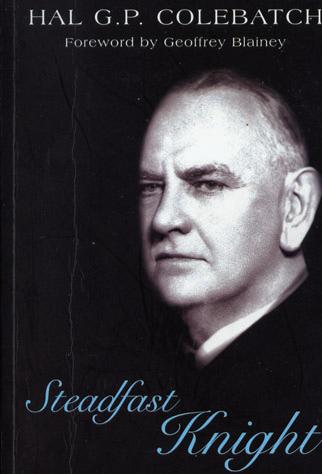
What do Catholics and Buddhists have in common? Well, quite a lot – especially in Perth.
Right now there is a group of people from very different faiths that are working together, sharing their spirituality and care for others, to help people that are a long way from our own prosperous and abundant Perth community. This interesting and eclectic group of people are volunteers with the Tibetan Support Programme (TSP). They have joined forces with over 40 prominent local painters, sculptors and designers, to put on an art exhibition to raise money to build the Gesar Sherab School which will offer boarding facilities for teachers and 250 children. This school will provide an opportunity for children of the Tibetan nomads of Kharnang to learn how to read and write.
This remarkable fundraising effort will generate funds from donated art to the exhibition themed Children: Our Inspiration.
It will be held at Gullotti Galleries in February 2005 and will feature works by artists including George Haynes, Elizabeth Maverick, Ross Miller, Keera Slaven, Fran’e Lessac, Peter Fitzsimmons, Camilla Loveridge, Aquilla McKenzie, Tania Ferrier, Abraham Dunovitz, Megan
Kerwan-Ward and Ian DeSouza. TSP was founded by Dr David Webb, a senior lecturer at the University of Western Australia when he heard about the dire circumstances surrounding the nomads and visited their community to identify ways of helping them. “Many children die in this remote region of China, with its harsh climate and rugged terrain – many do not return from a day out herding Yaks, and simply freeze to death. I really wanted to give these people access to “the west” because we have so much we can help them with,” said Dave, who is an ardent Buddhist.
Dave established the Tibetan Support Programme (TSP) to raise the necessary funds for the community to build a school for their children. “A school will not only educate them, it will keep them safe, secure, warm, dry and fed”, said Dave, “It is something we often take for granted here, but in places like Kharnang it is the opportunity of a lifetime.”
TSP is a small, but growing group of people that have been busy selling cards, running dinners and other events in WA to raise money. With the help of local artist Rebecca Cool, they are now organising an art exhibition that will be on every art lovers must-attend list for 2005. Lyn Hawkins, who is a practicing Catholic, mother of four and student at UWA got

involved with TSP when she heard about Dave’s experiences with these beautiful Tibetan nomads. “At



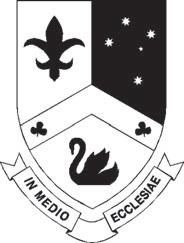

first I was guarded with my time, but when Rebecca Cool came up with the idea of the art exhibition, I couldn’t help but get involved… This is going to be a powerful way to generate funds for these children. It has also been an opportunity for my own kids to see how easily we can help less fortunate children get access to an education, in such an interesting and creative way… They are very excited about it and are planning things they can do at school next year to help raise awareness as well.”
The exhibition will
be launched at Gullotti Galleries, Murray Street, Perth on Friday 4th February 2005 at 6pm. It will be open to the public from 11am4pm Saturday 5th and Sunday 6th Feburary.
Kharnang sits at an altitude of 4500m and is home to thousands of ethnic Tibetan nomads who have struggled to survive through environmental disaster and other changes that have hugely impacted their lives. The remote location and lack of education had severely limited their access to support until a group of local monks, together with the first all-Tibetan Non Government Organisation in the region, decided to change the situation for the better.








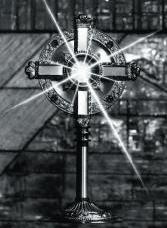


In September 2004 a delegation from the Catholic charity Aid to the Church in Need (ACN) visited China. The report below highlights the work of the religious sisters who face enormous difficulties in carrying out their pastoral work amongst their suffering Chinese Catholic brothers and sisters in Christ. The sisters’ names have been changed to protect their identity but their words are uncensored
"When I told my parents that I wanted to become a nun, their first reaction was one of dismay, because they were counting on me to work on the farm." Sister Zong is 23 years old and an only child. Like the other nuns living in this diocese, to the north of Peking, she comes from a peasant family. In China some 60% of the population still lives in the countryside.
All of her fellow religious sisters are aged under 40 years of age, except for eight who are all over 80. What with the persecutions of the 1950s, the Cultural Revolution from 1966 - 1976 and then the One Child policy, there are two entire generations now missing.
"Thanks to the One Child policy, and helped by antenatal screening, it is the girls that they murder first and foremost," one of them tells us. The fine imposed for a second child represents almost six months wages, and it doubles with each successive birth. It is a situation that is extremely difficult to endure for Chinese women, whether they are Catholics or not. They think twice before telling their husband about the arrival of a baby daughter.
"Without us, who can they talk to?", Sister Zong explains. The sisters try to reassure these young mothers, and in this way they manage to save many lives that would otherwise have been lost through abortion. "The official checks on new births are less frequent in the country than in the towns. Here families of three children are not a rarity", she adds.
"We think they must be the parents"
"I am proud of being a nun, because what we are doing has a profound value and the people have trust in us”, Sister Zong continues: "The mothers leave their babies on our doorstep; sometimes they are handicapped. They know that we will love them all." Given the absence of any adequate social care system, the government tolerates these Catholic institutions, thought it still keeps them under very close surveillance. They are not allowed to do anything more than take people in and care for them; any form of religious "propaganda" outside the designated places for religion is forbidden. And the needs are immense as was seen in one orphanage visited
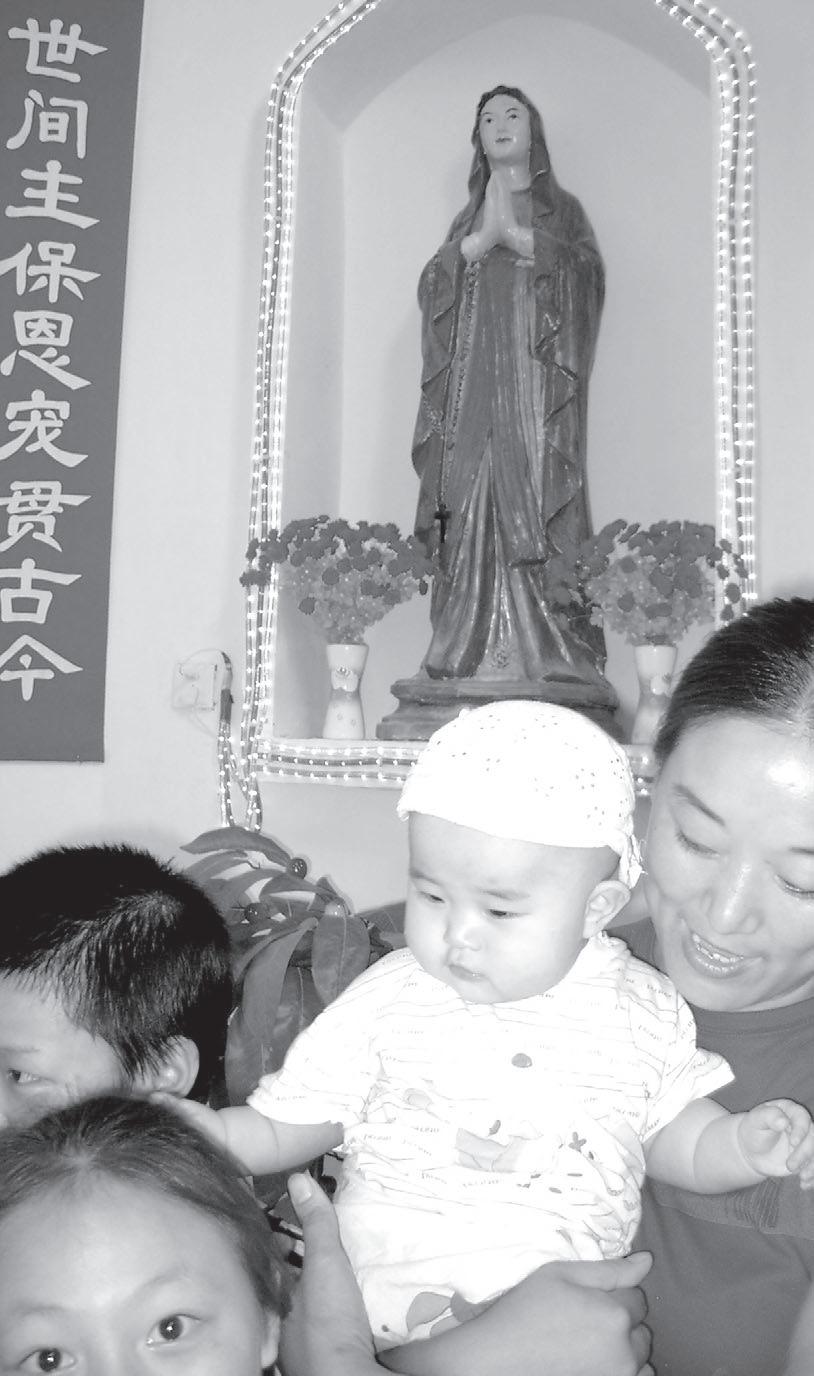
by the delegation in the heart of the Chinese countryside.
"There are so many children", says Father Zhang. Little Fung is visibly delighted to see him; with all the strength of his little arms, he crawls up to him - for he has no legs. To him Father Zhang is almost like his father. As for little Feng, he has a hare lip. Sister Yang hugs him affectionately. "Sometimes people come in, and then go out again without saying hello; they go up to the bed of a particular child", she tells us. "We think they must be the parents, but we never say anything. Here the children are happy. In the state-run institutions the living conditions are often terrible."
Modern China is a country of the young
The government has higher priorities on its list than the sociocharitable sector. "Modern China is a country of young people. The old, the deformed and the invalids have no place in it", explained Sister Zong. So when it comes to the homeless, the handicapped, the ailing - all these casualties of society that a Communist China, young and consumerist, ignores and rejects - it is the religious sisters who take them in. People like Mr Hong, who had been living
the foot of a cliff, where it is now exposed to the danger of landslides. The changes brought about by these major engineering works have affected the entire region of the Three Gorges and demand an exceptional degree of flexibility on the part of these sisters.
"We would like to be able to live a more recollected religious life", Sister Liu remarks. Moreover, at the age of 25, Sister Liu feels ill at ease in a society where, following the excesses of the Cultural Revolution, the condition of women has not really changed much. They are generally restricted to unrewarding duties, and women generally work more than men for a salary that is frequently four times less. Sister Liu would like to receive further training and above all to learn more about her sister religious all over the world.
"A traditional vision of Catholicism"
"Often we have a traditional vision of Catholicism", explains a Peking intellectual. "A vision that is more functional, attached to observances and work. But the vision of Vatican II is little by little coming through to us. That is why spiritual exchanges with other countries are crucial, for they represent an essential source of inspiration for these sisters, while at the same time bringing them closer to their own culture." Realistically, though, the possibility of these sisters going overseas for further studies is remote.
next door to the central rail station ever since coming out of jail during the Cultural Revolution.
When the sisters took him in, he had been living on the streets for 18 years. Now, at the age of 89, he is overjoyed to have found a home at last. And Mr Jing too has remembered how to smile again. He is 30, and proud to be able to walk upright. "I was living on the streets and I had terrible pain in my legs. Because of the way I smelled, no one would come near me. I had no money to drag myself to hospital. Father Fang brought me to a clinic run by Catholic nuns. One of them was a doctor. Both my legs were rotten. Father Fang organised collections to pay for my operation and for the artificial legs. Without their help I would be dead."
There is so much to do in this immense vineyard of the Lord. For example, in one convent established in the province of Sichuan the sisters lead a very full life. Their day starts 4.45 am and ends at 9.30 pm and they live according to a rhythm of prayer and work as they attend to the countless tasks before them. In Wanxian, the government is building the largest dam in the world. The cathedral built on the banks of the Yangtze was demolished and had to be rebuilt right at
volunteer for many years now, she is 65 years old and wears on her wrist a watch decorated with the Red Star. "I used to work as a government engineer", she says. "I wanted to be a Catholic, but when you are working for the state it is forbidden to be a Catholic. And so, when I reached retirement age, I was baptised and ever since then I have devoted myself heart and soul to the Church". Mrs Hong lives in the place where she works. She runs the library, directs a catechism group and invests a large part of her retirement in the diocese. Mrs Hong is hoping with all her heart that the Lord will forgive her the things she did when she was a state official.
Father Zhang has told her that God is merciful and all-powerful; ever since then she has striven night and day to repent. Father Zhang is a young and dynamic priest. In this "official" diocese, registered with the state, the bishop is very old. As a result Father Zhang has a great deal of work to do. On top of this, all his activities are scrutinised closely by the state, which from time to time arrests volunteers or religious who show too much zeal, releasing them only some time later.
Without the religious sisters and lay volunteers, the Church in China would not have the solid base that it has today. Whether the Catholics are "official" or "underground", the task before them is immense, as in the case of Madame Hong. A
The examples of Father Zhang and of Madame Hong show just how unwise it is to try and draw a dividing line between "official" and "clandestine" Catholics in China. For the pressure exerted by the government on the Catholic Church affects them all. To help the work of the religious sisters in China please send your donation to Aid to the Church in Need PO Box 6245 Blacktown DC NSW 2148. (02) 9679-1929. e-mail: info@aidtochurch.org web: www. aidtochurch.org http://www.aidtochurch.org
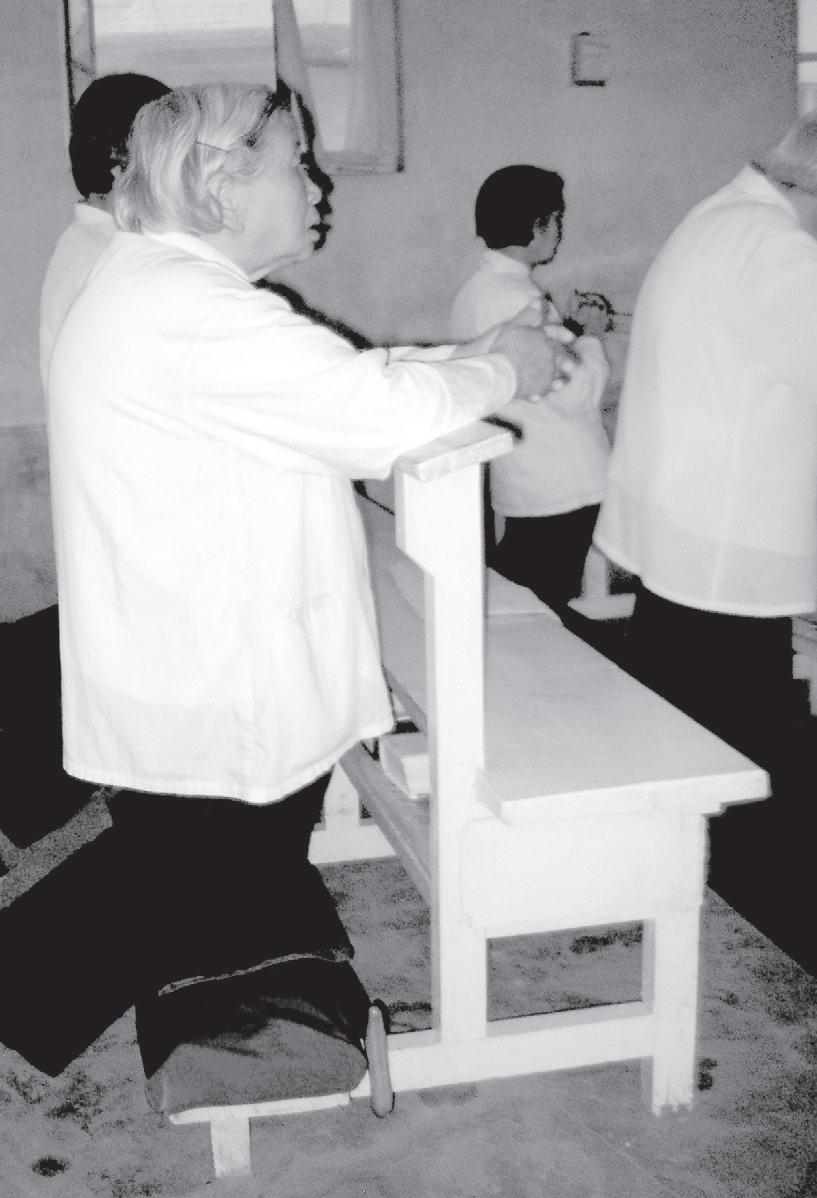
After spending the past 19 years in Africa, the last 10 of those in a war-torn and famineravaged Sudan, the eyes of Father Albert Sam burn passionately when he speaks of his experiences there.
■ By Mark ReidyFather Sam arrived in Australia and more specifically at the Our Lady’s Assumption in Dianella in March this year and despite his contentedness with his role as Parish Priest it is obvious that his time in Sudan has left an indelible mark.
His remarkable and courageous story began in his birthplace of Madras in India when as a seventeen year old he was “fished out” by the Order of his Salesian school and encouraged to attend a Vocations camp. From here he felt a call to give his life to helping the poor and abandoned youth through education, which is one of the primary focuses of the Salesians.
During his priestly training he became aware of the Order’s expansion into Africa and he instantly felt a desire to be a part


Sam responded and was sent to Egypt for two years to learn Arabic. He then spent a year in Khartoum in northern Sudan at a Technical School before heading into the town of Wau in the more volatile and dangerous south.
According to Father Sam the danger for the Salesians here arose from the Muslim Government in the north wanting to drive out the Christian influences of the south. This pressure climaxed soon after when the local Salesian Priest and Brother who had been working

they were not allowed back into the country.
Father Sam continued on despite the threats and persecution but as the Government refused to grant any more visas he was forced to work for the next two years without support. During his 10 years in Wau Father Sam would have no contact with the outside world for years at a time and his family often feared that he was no longer alive.
sustain this number of people and with the Government refusing to help and even hindering the UN from entering, thousands more graves were needed.
As the Government did not contribute any finances Father Sam would have to travel to Germany, Italy, France and Austria to raise his own funds. Although development was occurring, his health did not improve. Each year he would be bedridden for a month, often with a drip, as he battled malaria. However Father Sam was not able to leave at this time as no volunteers could be found to replace him. He points out that he was always fulfilled with what he was doing but as a result of his health struggles, after ten years in Sudan, he sadly bade his beloved people farewell.
He describes his arrival in Australia and the freedom that comes with it as” taking a fresh breath”, but it is obvious that whilst you can take this Priest out of Sudan you cannot take Sudan out of this Priest.
He continues to try and raise money to send directly to the Diocese of Wau to assist with the running of the schools and also with newer programs such as their work with child soldiers and street children.



of this. He had to wait another three years however until he could fulfill this call.
So at 23 years of age and only two years after his ordination Father Sam found himself in Tanzania establishing a Technical School for the poor. During his three years there he learned the Swahili language, which assisted him in his next four years in Kenya as he helped establish Youth Centres and Trade Schools in the slum areas.
At this time word came through that rebels in southern Sudan had kidnapped a fellow Salesian priest and the Order was forced to abandon its Mission there.
Despite the dangers the Salesians soon after asked for any volunteers to go into Sudan to complete the unfinished projects and to establish Technical Schools there. Father
with Father Sam were imprisoned by Army soldiers. He explained that he had just left for a holiday in Khartoum when he received word that the soldiers had burst into the house and taken them prisoner. When the Bishop tried to intervene from Kenya (the Government refuses to grant him a visa) he was told that the printing press used for the schools was in fact being used to support the Rebels who had for years been fighting the Government. Fr Sam said this allegation was part of an ongoing campaign of misinformation and intimidation. He stated that the Press had only ever been used for printing schoolbooks, which occurred because the Government refused to give Christian schools any support. Through Vatican and BBC Television Network pressure the two men were released but
During these first years as the only foreigner, Father Sam organised the running of the John Paul School and the establishment of a Youth Centre, which, because there were no other activities around, drew many young people.
Father Sam was then constantly harassed by the local Security Force, which was made up of Government controlled Muslim soldiers with unlimited powers, whose desire, he says, was to force him to leave the country.
Students who assisted with any printing were threatened and at times taken away and beaten. Other students were used as spies as they constantly monitored Father Sam and his colleagues.
People who spoke out against the Government would suddenly disappear, never to be heard of again. During these two years Father Sam’s health deteriorated and continued to do so even after another Priest arrived to assist. His health continued to decline in 1998 when the Army entered and attacked the Rebel soldiers in the area.
After the brutal conflict, which lasted almost a week, Father Sam said that there were thousands of mutilated bodies left to rot throughout the town, not only of the soldiers but also those of students caught in the crossfire. Father Sam spoke of the raping and pillaging that occurred throughout the town and shared several stories of his students being killed as they tried to flee and of community members being murdered. In some schools half the students died. Those left helped him dig graves and bury two or three hundred bodies each day.
The remaining Rebels fled into the rural area around Wau. They stole food supplies from the land occupiers and consequently drove many thousands of them into town. There was not enough food to
When help finally arrived, an Orphanage for over three hundred children was the first priority. Father Sam then handed over the running of three Dispensaries and thirteen schools with their eleven thousand students to the new Priest and became the Development Coordinator.
This role included organising the Orphanage and running programs for Education and Health.
He also established four more schools, including the designing and structuring, as the Community now had to cater for the thousands of refugees who decided to stay for educational reasons once the famine was over.
These programs also included the feeding of the students whose one meal a day came from school.
In Australia Fr Sam plans to do what he can for African people living locally. He can see the need for the Catholic Church to be proactive in its response to the growing number of African Catholics. He has been approached by the Perth Vicar for Migrants, Fr. Anthony Pagononi, to assist in helping to establish a weekly African Mass and to form Communities within the Church that can assist in nurturing their specific identities and cultures.
He may now be another life away from his experiences of the last ten years, but it doesn’t take long to recognise that part of this Priest’s heart still beats in Sudan.
Anyone wishing to donate money to Sudan can contact Father Sam on 92761008.
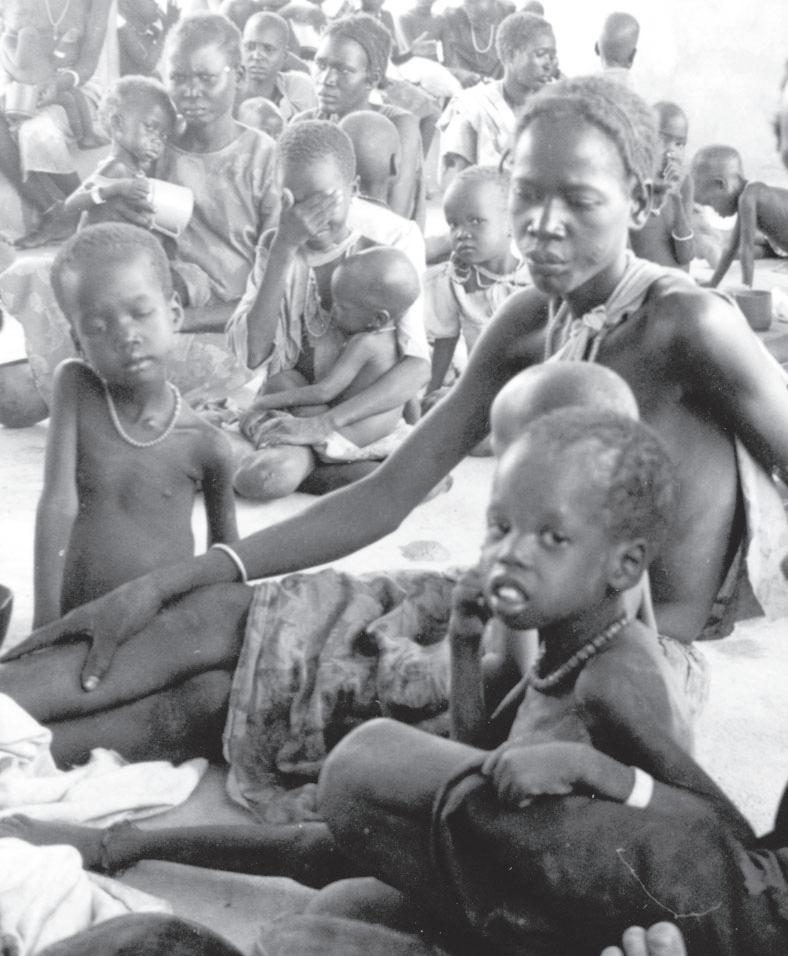




Two weeks ago (on November
25) The Record carried a report of a catechists’ conference illustrated by a photograph of some of the catechists walking around what is described as a ‘mandorla’.
What the picture actually showed was a reproduction of the mysterious labyrinth or maze on the floor of the nave of Chartres Cathedral.
One can only speculate why such a pre-Christian image came to be incorporated so prominently (it is 12 metres in diameter) in a Christian church.
Originally there was even a copper plaque in the centre (now lost, but recorded by an 18th Century scholar) depicting the Minotaur who lurked in the Cretan labyrinth, together with the Greek hero Theseus who killed him, and the princess Ariadne who helped Theseus to escape from the maze. So it refers very explicitly to a mythological pre-Christian past, which makes it even more puzzling.
Perhaps it represents the twists and turns of the Christian journey to the heavenly Jerusalem, but it seems that no-one is quite sure what the symbolism is. There are labyrinths in other cathedrals too. In Amiens there was one on which children (of course!) used to play during Mass. This was destroyed in the 19th Century by a Cathedral cleric who disapproved of the noise, but has since been replaced by a copy.
In Chartres Cathedral there is indeed a mandorla, but it is not the sort of thing you could walk on. ‘Mandorla’ is an art-historian’s term for the almond-shaped frame, like a full-length halo, which surrounds the figure of Christ in Majesty, as portrayed on many Romanesque churches, and magnificently above the Royal Portal at Chartres
Janet Kovesi Watt ClaremontAfter years of legal and illegal euthanasia, both voluntary and involuntary, Holland has now stepped further along the legalised murder path. They now have euthanasia lawful for children under 12. How can a minor give informed consent to being killed? And where to next?
Meanwhile, fast cars, under 25s and consequent deaths have been fairly recent news items.
Some time ago, a girl received a Ferrari for her 18th birthday and
proceeded to drive herself to her death in it. More recently, a twentyyear-old killed himself and three other people (including an unborn child) doing about 160 km/hr.
The numbers of these tragedies can be reduced, if someone in the government will have the gumption to do what is necessary. The solution is so obvious.
It should be illegal to own or drive a vehicle which goes faster than 100 km/hr if you are under the age of 25.
C.V. Phillips Queens ParkThe latest attempt at humour by the advertising agency handling the bread ad for Brumby’s Bakery account, is a throw-off at something held very sacred in the Catholic Church and elsewhere – the Eucharist.
Having spent my entire life in businesses associated with promotion, I was always under the impression that advertising was intended to create good will for the product.
This commercial, which is an “own goal” may result in a lot of childish giggling emanating through the curiously crafted whiskers of ad-men over an extended lunch, but more importantly, it will create widespread resentment among devout Catholics.
No formal boycott of Brumby’s bread will be needed. Many people will resolve independently what I have already done. I have decided never to buy their bread during my lifetime.
Frank Bellet Petrie, QldJohn Massam (Record 16 December) correctly identifies some of the injustices presently perpetrated against Muslims in various parts of the world and how this is fuelling Muslim fundamentalism. But his historical perspective is unbalanced. While the Turkish system of using Janissaries merits condemnation there was much the Christians of earlier times did that equally merits the same. For instance, history records that when the Crusaders took Jerusalem they butchered the inhabitants, Muslims, Jews and Arab Christians alike.
150 years later when Salladin the Great re-took the city, he did a “fiendish” thing. Instead of executing everyone in sight he ransomed captive nobles. I recall reading stories as a child of how horrible this was as Christian families in Western Europe had to find large sums of money to save their relatives. Then when I learned about what the Crusaders did with captives I decided I’d rather be captured by the Saracens than the Crusaders!
One can find injunctions to destroy infidels in the Koran and similar calls to retribution in the Bible. This doesn’t, of itself, prove the peacefulness or otherwise of any religion. We all need to work towards peace and goodwill whether we are Christian, Muslim,
Jewish, Hindu or Buddhist. To do this we need, first of all, to be honest about history and the current causes of Islamic fundamentalism. Neither should we forget the Christian, Hindu and Buddhist (Sri Lanka) fundamentalists who are just as dangerous to world peace as their Muslim brothers and sisters.
Joe Goerke LesmurdieWith your great publication discovery going to 68,000 families six times a year it seems an excellent medium to inform consciences in an aspect of Australian life which shames us all.
I speak of the treatment of asylum seekers, most of whom have endured in excess of three years behind razor wire; several are into their sixth or seventh year of “indefinite” detention.
It was in May that our CCJDP called on the Federal Government to “release children and their parents immediately”. At the same time the Holy Father called for heartless treatment of refugees to stop. The Archdiocese of Melbourne also undertook about the same time to have the Cathedral bells rung for an hour every tenth day of each month to remind the public of the abhorent treatment of asylumseekers. The Christian Brothers’ Edmund Rice Foundation has in its web site strongly spoken out against the government’s treatment of asylum seekers.
Why can’t we Catholics get united? Obviously at the top level there is unanimity of revulsion but no cohesion of purpose. This is very sad and needs addressing. A coordinator perhaps... but who?
Currently we have in South Australia’s Baxter camp several refugee status-seekers at their wit’s end after more than three years of imprisonment who have, for a week, sewn their lips on hunger strike, and who are willing to die rather than face the shameful choices they have.
These are: (1) be forcibly repatriated to the country from which they escaped where they feel certain they will be killed, (2) endure the rest of their life in razor-wire compounds or (3) commit suicide rather than endure the ugliest of laws (life imprisonment) in which Australians in general seem disinterested.
When Trinitarian Sister Peter Claver Fahy came to Philadelphia at the age of 80 to begin a ministry of prayer in her official “retirement,” she immediately set to work in some of the toughest prisons in the region.
She continued to work without fanfare, leading prayer and Bible readings in her ministry to incarcerated men and writing letters to judges on their behalf, until she could no longer hobble down the long prison halls at age 99.
Christmas Island and Nauru have large numbers of suffering people who fled for their lives, people who, by virtue of the fact that they got here, have displayed heroism worthy of high praise, even medals. Lombok in Indonesia has 600 people whose boats were towed back by our navy when they were within meters of Australian soil. This group are not even mentioned in any media but it is a fact that the Australian Government pays Indonesea substantial sums to keep these people there. Independent bodies have costed this figure at $764 per day per person for this drain on Australian taxpayer dollars.
These facts ought to be made public. If our own Bishops’ conference, our own Holy Father have spoken out, the dreaded “don’t mix religion and politics” scenario has already bolted. And so it should.
I urge you to find a way to persist with this point for as long as it takes to see this shameful practice by our government ended.
Facts which you undoubtedly already know are that (1) Australia receives very few asylum seekers compared to other countries, (2) no other country has non-reviewable mandatory detention (3) our annual quota of refugees is 12,000 but most years we do not manage that, (4) in Sweden the maximun time a child is kept in custody is 6 days, and with only half our population, Sweden receives a similar number of refugees per annum (5) most refugees from Afghanistan and Iraq are legitimate; 93 per cent of Afghans and 97 per cent of Iraqis are found to be genuine.
Norman Bernard BrigadoonYou may have recently read articles or heard about organisations that are attempting to diminish the importance of Christmas and the message of Christ’s birth for fear of offending minority religions.
The facts speak for themselves. These stats are an important tool in fending off argument. Yes, we should be sensitive to minority religions but the reality is that 60% of our population are Christian and to diminish the importance of the Christmas is to offend the majority of the population.
“All her life she found creative ways to work with the poor and to work with prisoners."
Loved and respected by wealthy businessmen and prison inmates, Sister Peter Claver died on December 3 at the age of 105 at the motherhouse of her order, the Missionary Servants of the Most Blessed Trinity, in Philadelphia. Sister Peter Claver’s influence was wide enough to encompass
The 2001 Census statistics for Kalgoorlie/Boulder are as follows:
Christians 17190 60%
Hindus 24 <0.5%
Muslims 61 <0.5%
Jews 10 <0.5%
Buddhists 146 .05%
Others 103 <0.5%
No religion 6462 22%
Not stated 4821 17%
Total 28817
Let us all confidently defend Christmas and its meaning.
Robert Hicks KalgoorlieMy idea for celebrating the Year of the Eucharist is to make a poster entitled “Make the World a Eucharist Land”. Children and adults could devise them and possibly The Record could have a competition with categories, and give certificates for the ones judged the best.
Hopefully, an idea such as this would give glory and praise to Jesus.
John Brennan GreenwoodLast year I wrote to say that I had erected a simple and very inexpensive Christmas Crib on my subdivision and expressed the hope that more Christians would be inspired to do the same. This Christmas my manger is complete and is once again a humble reminder to neighbours and passers-by that Christmas is more than what secular humanism has made of it. It is a reminder of the time when God came to live among us. Whilst I am glad to say that the sight of it has inspired much good will we have also experienced indifference and even Christianophobia, which apparently is on the increase around the world along with antiSemitism and Islamophobia. Thus it is more important than ever to defend our beliefs.
May I also take this opportunity to congratulate The Record on its Christmas issue? It was also an oasis of spiritual refreshment in a desert of frenzied consumerism which gets worse each year that passes. God bless you all and have a Happy New Year.
Patricia Halligan Mandurahthe great Catholic activist Dorothy Day, and inmates at the Curran Fromhold Correctional Facility.
“She had a profound impact. She was an extremely zealous missionary, and she was able to think outside the box,” said Sister Barbara deMondeville, historian for the Trinitarian sisters.
“All her life she found creative ways to work with the poor and to work with prisoners. She established houses of hospitality for women in crisis long before that was the thing to do.” - CNS
THURSDAY, 30 DECEMBER, 2004
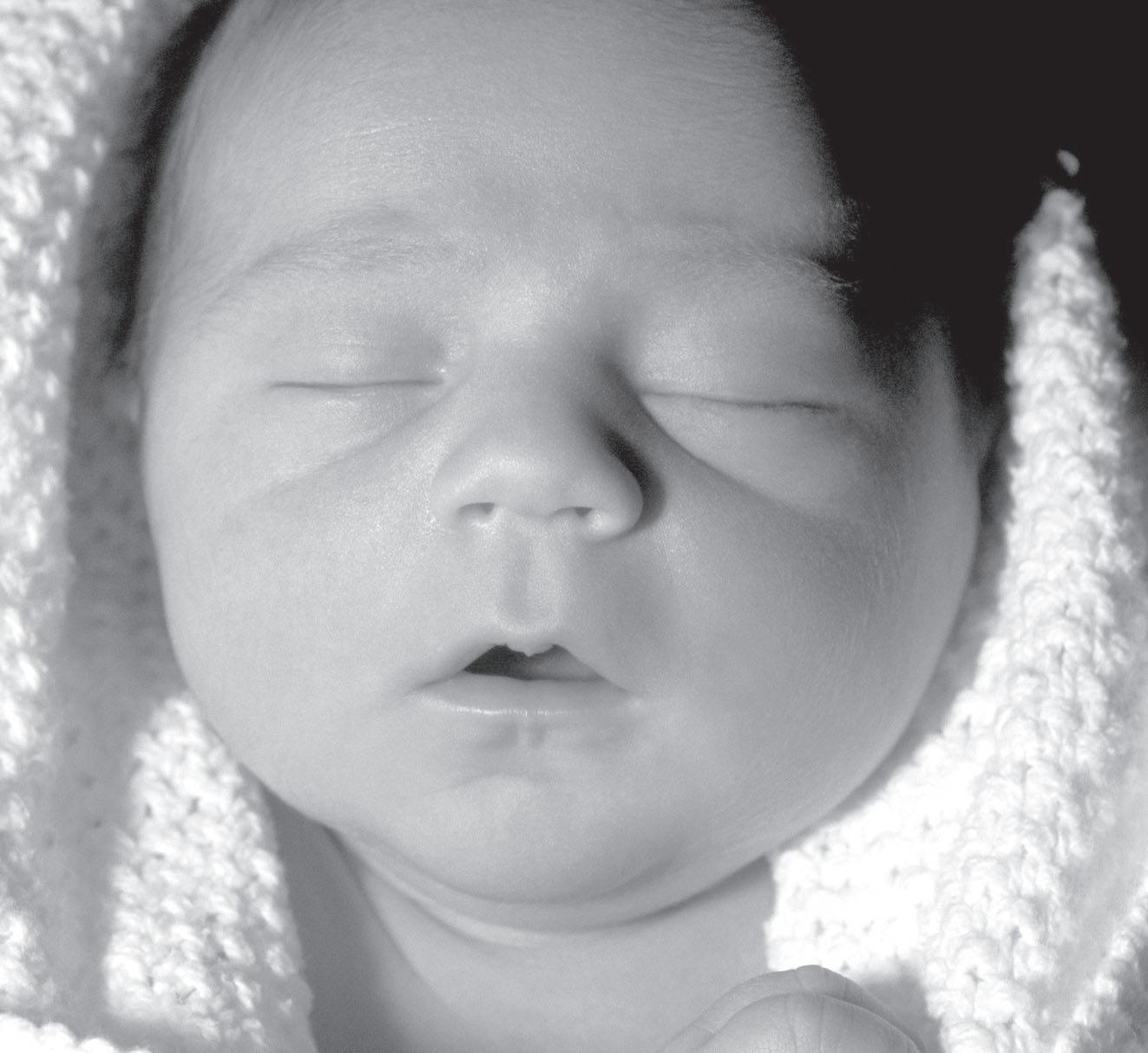
Handicapped British woman Alison Davis once campaigned for euthanasia and abortion, says the Catholic Herald's Colin Harte. Today she is a pro-life activist.
I am in an enviable position as a writer. I have known and admired Alison Davis for many years, but I know she will not read this article. Alison's unwillingness to read about herself in newspapers or to watch herself on television reflects her unease at being in the public eye in any way.
Yet this most private of women has campaigned for some of the most vulnerable people in society. Last month, she was named one of the Catholic
Women of the Year for her work with the disabled.
"It took me a couple of weeks of agonising before I said yes to the award," she says. "I find such things embarrassing. I took advice from friends and they thought I should accept, not so much for myself but for the causes I care about."
A visit to Alison's Dorset village home reveals the greatest joy in her life. Pictures of her with
hundreds of beaming, disabled Indian children adorn the walls.
For many years she has worked for the Society for the Protection of Unborn Children (SPVC) as the coordinator of "No Less Human," a group for disabled people, their families and carers, that campaigns for the equal right to life of all disabled people, from conception to natural death.
Continued on page 8
INSIDE: - ■ What Catholics have believed about Jesus in the Eucharist over 2000 years - and how to defend that belief.
Continued from page 7
The interest is personal: Alison was born with spina bifida. She is in constant pain and is confined to a wheelchair. She considers herself fortunate to have been born in 1955, before the passing of the 1967 Abortion Act.
"Today, 90 per cent of babies with my disability are aborted," she says.
She points to a photo of a baby girl, born with anencephaly, who died after just 24 hours. Alison speaks movingly of the "inherent, infinite value of every human being, which can only be demonstrated by speaking out uncompromisingly for those who are the most vulnerable".
Yet this committed prolife Catholic woman was once a convinced atheist and pro-abortion demonstrator. Her conversion came after "years of desperation", beginning in 1985 when, she says, her whole world fell apart.
"I was having severe spinal pain as my spine was collapsing, trapping nerves. Some doctors believed I did not have long to live. Then my husband left me, and there were other very personal traumas. I wanted to die, and this became a settled wish for death which lasted several years."
She was determined to kill herself, and attempted suicide several times.
"I was saved only because friends intervened and called 999," she says. "In hospital I refused consent for life-saving treatment but after I lost consciousness I was treated. If the doctors hadn't intervened I would not be alive today."
If voluntary euthanasia had been legal, Alison would have requested it. "I would have qualified for euthanasia," she says. "My request would have been granted. I would now be dead."
She describes the British Government's Mental Capacity Bill, currently being debated in Parliament, as "terrifying".
In hindsight, euthanasia would have deprived her of a renewed relationship with God and the "blessing" of working with and for disabled children.
Her spiritual conversion came at the instigation of a
close friend - an Anglican vicar. He gave her a copy of the Bible to read. "I didn't want it to be true, and I tried my hardest to pick holes in it, to prove it wasn't true," she says. "But, in the end, I had to accept the reality of Christianity."
The next step was to try several different churches. "I did not feel that God was really there in any of them, except the Catholic Church. I felt His presence there and I wanted to belong."
She was received into the Church on Easter Sunday 1991.
"And, since then, you could say that life really has been a bed of roses. Remember, however, that roses sometimes have thorns. Seeing life's meaning, when the flowers are absent, is one of life's challenges."
She is critical of society's ignorance of what it means to be disabled, to have rights, to have your dignity respected.
"Many churches are simply inaccessible - not only problems with steps but no appropriate places for wheelchair users to sit," she says.
"People can be patronising too - there's that awful idea of 'welcoming' the disabled with inappropriate touching or intrusive remarks."
She goes to Mass at St Augustine's Church in Weymouth, which she says has "an excellent parish priest" in Fr Philip Dyson.
"He had the good sense to cut away the ends of a few benches to make places for wheelchair users.
"I wish other parishes would follow his example.”
Alison becomes most animated when talking about the hundreds of disabled children in India whom she clearly loves as though they were her own. She met the children when she visited them for two days in 1995. At that time, there were about 50 children being cared for by a local priest, Fr Gali Arulraj, in Andhra Pradesh, southern India. Alison had made a brief stop to visit Fr Arulraj's project en route to a conference in China. The trip changed her life.
"I hadn't anticipated how overwhelming their love would be," she says. "Many of the children are so severely disabled that they can only
crawl in the dust. They all come from extremely poor families.
"After leaving the children, I had a particular reason to live. I knew I would return the love that the children had given me."
Returning to England Alison set up a registered charity, Enable (Working in India), and the funds soon started coming in.
"People responded generously when they learnt that a donation of 200 pounds [approximately A$500] would pay for an operation which meant the difference between crawling in the dust and being able to walk. It costs just 15 pounds to provide residential care for a child for a month. Many supporters sponsor a child at whatever monthly rate they can afford. But we always need more. And every penny goes to India."
Because of Alison's fundraising with Enable, Fr Arulraj is now caring for 352 children. And, remarkably, Alison has achieved all this in addition to her full time work for SPUC.
I accompanied her on a visit to India earlier this year and witnessed the extraordinary bond of love that exists between Alison and the children. The children love her as a mother and call her "Mummy Alison".
She still experiences severe spinal pain; the children know that she understands their difficulties. She has spent many hours learning the children's language, Telugu and she converses fluently. "Each child is precious to me," she says.
As we left, the children cried and garlanded Alison with flowers, showering her with thousands of petals. Appropriately, they were rose petals. When she is with, or thinking about her, children in India, Alison's life seems, as she says, to be a bed of roses - without any thorns.
Those interested in making a donation or getting information about sponsoring a child can contact Enable (Working in India) on Tel: 0011+44+1258 837546. Note: the UK is currently 8 hours behind WA time. Email: enable. india@btinternet.com.
A sample of Alison Davis's contribution to the euthanasia debate in the UK can be found on the Internet at: http://observer.guardian.co.uk/ comment/story/0,6903,837273,00.html
The web page of the charity which she established can be found at: http://www.access-databases.com/Enable/index.htm
It's well worth the visit.
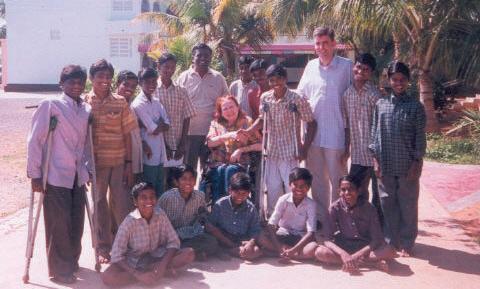



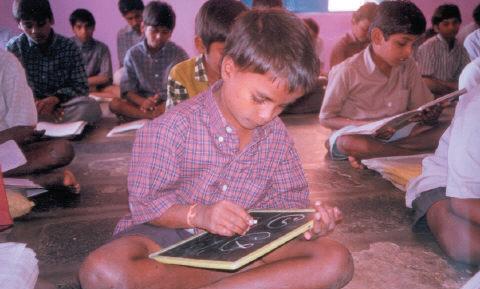
It is impossible to overstate the importance and meaning of the Eucharist in Catholic life, teaching, and theology.
“Our way of thinking is attuned to the Eucharist,” wrote St Irenaeus in the second century, “and the Eucharist in turn confirms our way of thinking.”
Centuries later, the Second Vatican Council declared in Lumen Gentium (Dogmatic Constitution on the Church) that the Eucharist is “the source and summit of the Christian life.”
In the centuries between, the Church has contemplated, studied, defined and defended her belief, as stated by the Council of Trent, that “in the Blessed Sacrament of the Holy Eucharist, after the consecration of the bread and wine, our Lord Jesus Christ, true God and man, is truly, really, and substantially contained under the appearances of those perceivable realities.”
This belief in the Real Presence is central and distinguishing. It is also at the heart of the controversies and divisions that have arisen around the Eucharist at different times in the history of the Church.
The Eucharist is a direct result of the Incarnation and the Cross and is a miraculous continuation of those great mysteries of the faith. The Eucharist is the crucified and risen Christ, offered under the appearance of bread and wine. This should be obvious to Catholics, but it is a truth that cannot be taken for granted, especially when so many misunderstandings and false ideas exist about it.
In the Eucharist, the unique, one-time paschal mystery is offered sacramentally to those generations that come afterwards. The Eucharist is sacrifice and meal - the two realities are intimately joined. The Second Vatican Council’s Sacrosanctum Concilium (Constitution on the Sacred Liturgy) summarises: “At the Last Supper, on the night when He was betrayed, our Savior instituted the eucharistic sacrifice of His body and blood. He did this in order to perpetuate the sacrifice of the Cross throughout the centuries until He should come again, and so to entrust to His beloved spouse, the Church, a memorial of His death and resurrection: a sacrament of love, a sign of unity, a bond of charity, a paschal banquet in which Christ is eaten, the mind is filled with grace and a pledge of future glory is given to us.” “Eucharist” comes from the Greek word eucharistia, which means “thanksgiving.” This thanksgiving is an act of faith and worship, an acknowledgement of God’s work of salvation and a confession of man’s need for God’s grace and mercy. The word “eucharist,” explains the Catechism of the Catholic Church, recalls “the Jewish blessings that proclaim - especially during a meal - God’s works: creation, redemption and sanc tification” (No. 1328). The
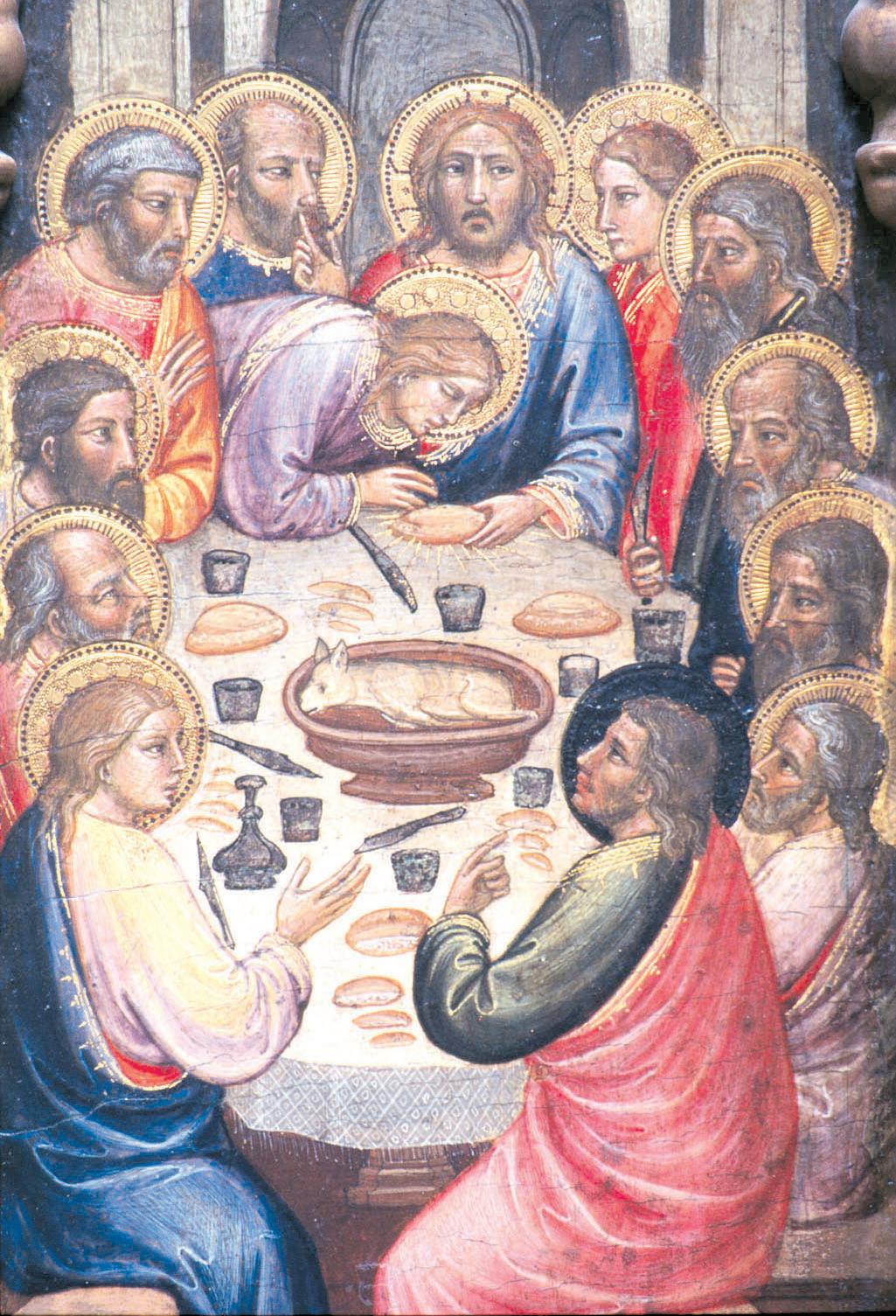
The Eucharist is an endless number of unified elements. It is a meal, a communion and a celebration. It is the sacrificial offering of believers - as sons and daughters of God and as members of Christ’s body - to the Father. It is the sacrifice of Christ made truly present.
Eucharist is an endless number of unified elements. It is a meal, a communion and a celebration. It is the sacrificial offering of believers - as sons and daughters of God and as members of Christ’s body - to the Father. It is the sacrifice of Christ made truly present.
The Eucharist is described in many ways: the Lord’s Supper, the breaking of bread, the holy sacrifice, the Divine Liturgy, holy Communion, holy Mass and many others.
God nourishes and sustains His
family, the Church, in many ways, but the most profound means is the Eucharist. It is the unifying principle and reality of the family of God, creating communion by communicating the body and blood of the head of the Church to those who make up the body of the Church. In the Eucharist, the Catechism states, Catholics experience unity with one another and “an intimate union with Christ Jesus.”
Over the centuries, objections to belief in the Eucharist have
bread and wine before and after the consecration look exactly alike. Furthermore, they smell, taste and feel the same. In fact, all empirical evidence supports the interpretation that they do not change at all.”
This reliance on “empirical evidence” raises difficult questions. Since when does Christianity rest exclusively on scientific evidence? Where is the empirical evidence for the Virgin Birth? Angels? The Holy Spirit? Heaven? And where is the scientific proof that Jesus was completely God, completely man? How is the miracle of the Eucharist more unbelievable than the Incarnation, the Virgin Birth, the death and resurrection of Jesus or the Trinity?
Then there are the teachings of Jesus, who said at the Last Supper, “Take; eat; this is my body,” and, “Drink ... for this is my blood” (Mt 26:26-30) and in the”bread of life” discourse, “My flesh is true food, and My blood is true drink” (Jn 6:51-59).
This is not metaphorical language. Nor is Paul using metaphorical language when he asks, “ Is not the cup of blessing we bless a sharing in the blood of Christ? Is not the bread which we break a sharing in the body of Christ?” (I Cor 10:14-22).
In fact, no Christian interpreted these words metaphorically until a thousand years after they were written.
Another criticism is that the Catholic Church allegedly teaches that Jesus must be “re-crucified” at every Mass. Presbyterian theologian Loraine Boettner claims in “Roman Catholicism” that the Mass “is in reality a recrucifixion of our Lord over and over again, in an unbloody manner.”
This is a faulty understanding. What the Church really teaches is that the eucharistic sacrifice brings into present time the saving effects of the once-for-all-time death of Jesus. While the work of the Cross is indeed finished and will never be repeated, its benefits and power are applied today through the Sacrament of the Eucharist, according to the commands of our Lord.
been made, most notably by certain Protestants.
One objection is that the Eucharist cannot be the true body and blood of Christ because no perceptible change can be seen after the consecration of the gifts.
Evangelical author James McCarthy, a former Catholic, writes in his book “The Gospel According To Rome” that “there is not even the slightest indication that either the bread or the wine changed at the Last Supper. The same is true at the Mass today. The
Ironically, the idea of Christ’s past work being efficacious in the present is not novel to many Evangelical Protestants. They believe that when a man “accepts” Christ into his heart or has a “born-again” experience that the work of Christ on the cross is applied to him through faith.
Some even say they have been “washed in Jesus’ blood,” but they don’t believe Jesus is recrucified every time a Christian makes a profession of faith.
Unwittingly, they implicitly believe what the Catholic Church teaches: The effects of Christ’s death on the cross are just as powerful and present today as they were 2,000 years ago.
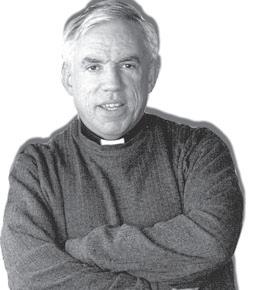
Question: I am an acolyte, and when I visit parishes other than my own to attend Mass, I see other acolytes doing various things that I was told acolytes should not do. Exactly what are the duties of an acolyte?
Imyself have been in situations where acolytes have done a bit more than their brief permits. Here is a summary of their duties, as given in the June 2001 General Instruction of the Roman Missal:
a) In the procession to the altar the acolyte may carry the cross. (no. 188)
b) Throughout the celebration the acolyte is to go to the priest or the deacon, whenever necessary, in order to present the book to them and to assist them in any other way required. (no. 189)
c) After the general intercessions, when no deacon is present, the acolyte places the corporal, the purificator, the chalice and the Missal on the altar, while the priest remains at the altar. Then, if necessary, the acolyte assists the priest in receiving the gifts of the faithful and, when appropriate, brings the bread and wine to the altar and hands them to the priest. If incense is used, the acolyte gives the thurible to the priest
and assists him in incensing the gifts, the cross and the altar. Then the acolyte incenses the priest and the people. (no. 190)
d) If needed, a liturgically-instituted acolyte, as an extraordinary minister, may assist the priest in giving Communion to the people. If Communion is given under both kinds, when no deacon is present, the acolyte administers the chalice to the communicants. (no. 191)
e) Likewise, after the distribution of Communion, a liturgicallyinstituted acolyte helps the priest or deacon to cleanse and arrange the sacred vessels. When no deacon is present, the acolyte carries the sacred vessels to the side table, and there cleanses, wipes and arranges them in the customary way. (no. 192)
f) After the celebration of Mass, the acolyte and other ministers return in procession to the sacristy with the deacon in the same way and order in which they entered. (no. 193)
I am aware of the fact that acolytes sometimes do more than the General Instruction permits. In several parishes where I have celebrated Mass, the chalice - with wine in it - has been set before me. When I have asked for the water, I have been told by the acolyte, “I already put in the water.” Only an ordained minister (bishop, priest or deacon) is permitted to do this. No. 190 above says nothing about the acolyte mixing the wine and water. Besides, there is a prayer that is said at the mixing of the water into the wine, which I doubt these acolytes say.
I have also been in parishes where the acolyte has either offered to, or told me that he would, distribute Holy Communion while I remain seated. No. 191 above
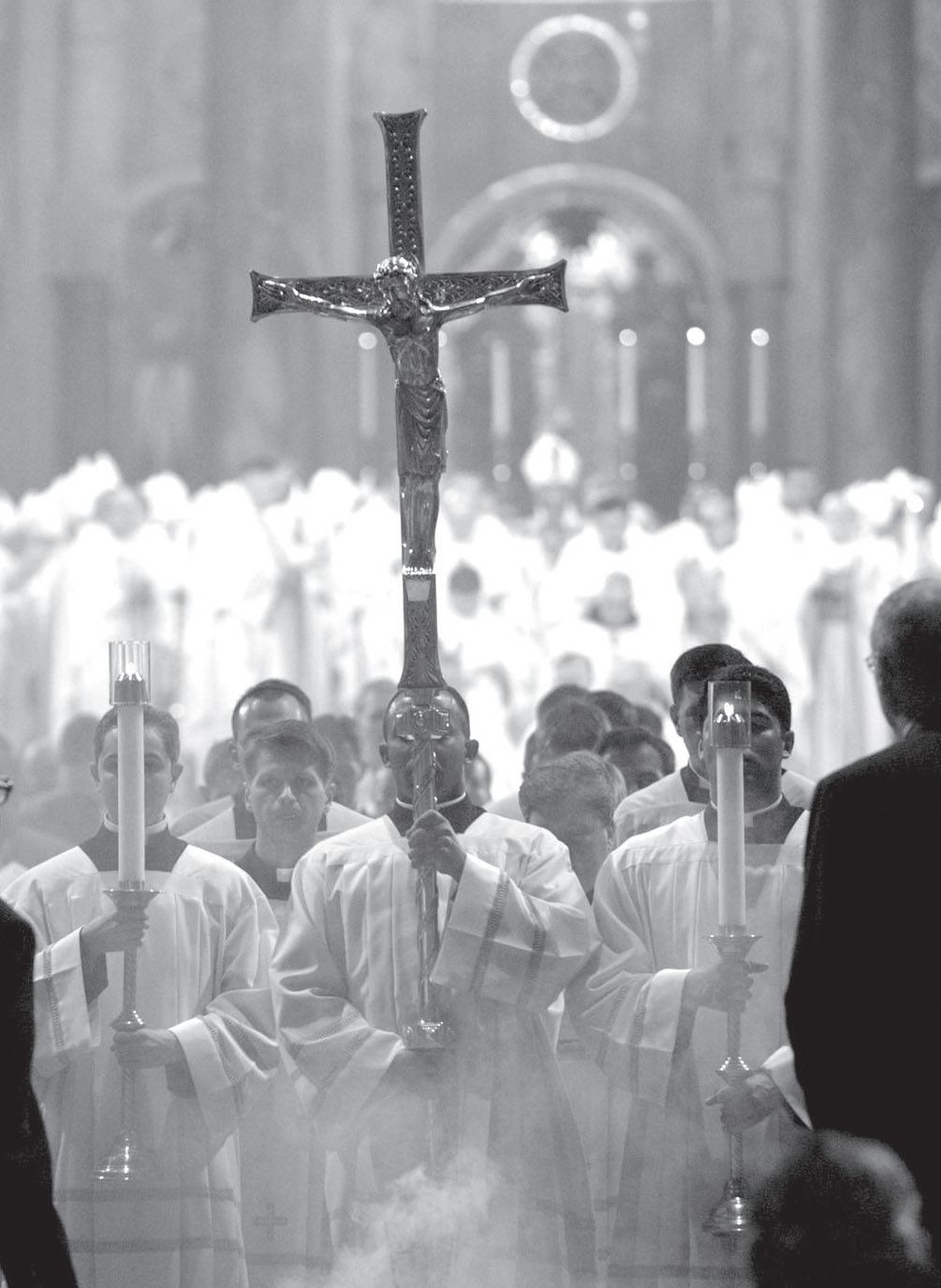
says that the acolyte may assist - if needed - but not substitute for the priest.
An exceptional situation is foreseen - when the priest is prevented by weakness or advanced age or for some other genuine reason. But one must not abuse the exception allowed by the phrase “some other genuine reason.”
I have been in places where the acolytes stepped forward to assist
If culture is the oxygen of our lives, the rite, incorporating symbols, images and prayers, enables us to reach out toward the unseen things above which are eternal. These aids to worship, in turn, help shape our cultural heritage, bridging the gap between ourselves and the God of revelation.
Rich in linguistic, cultural and historical elements, the rite, as our tradition perceives it, creates and validates the existence of a particular community.
At the moment in the Church we have the western (Latin) or ‘Roman’ Rite and the eastern ‘Oriental’ Rites, drawing on the heritage of ancient sister churches, based at Alexandria (Egypt), Antioch and Constantinople (Turkey), in Armenia and in Irak (Chaldeans).
We might note that each of these Rites has its own specific liturgy not translated from a common source.
It is couched in a particular language, which is also being used in official documents: liturgical, doctrinal, moral and legal.
These rites go back to the early foundational period of the Church.
Referring to these rites, the Vatican Council II, in its constitution on the Liturgy, states that:
■ All the rites are to be considered as equal, possessing the same rights and standing.
■ The Church wishes these rites to be upheld and fostered. Where it is thought to be necessary, it also advocates that the same rites be reviewed and revised within the context of their traditions and made more vibrant and responsive to local needs.
These favourable comments call
for practical action by the Catholic hierarchy: specific canons specify that churches should be erected where necessary, and priests of the same rite or an episcopal vicar should be appointed in areas where among the faithful there is a sizeable number of people from Oriental rites.
With very few exceptions, specialists maintain that territoriality is not an essential factor in constituting the scope of a particular Church, but is merely an external, functional factor - even though it is most frequently invoked.
The defining moment of the Church is when it is gathered to listen to the Word of God under the leadership of a bishop presiding over the celebration of the Eucharist. Because the person of the bishop remains central in the life of the Church, the bishop of the Catholic rite bears responsibility
be corrected with all haste. (no. 73) An acolyte may expose the Blessed Sacrament for a period of adoration. He may not, however, give the Benediction - i.e, bless the people with the Host.
There have been those acolytes (and lectors and extraordinary ministers and sacristans) who will tell me, “Our priest said that we can do such and such a thing.” No priest, deacon or even a bishop has the right to depart from the Church’s established norms. Anyone who gives free-rein to his own inclinations, even if he is a priest, injures the substantial unity of the Roman Rite... Arbitrary actions are not conducive to true renewal, but are detrimental to the right of Christ’s faithful to a liturgical celebration that is an expression of the Church’s life in accordance with her tradition and discipline.
(RS no. 11)
with the Breaking of the Bread before Communion. The March 2004 Instruction ‘Redemptionis Sacramentum’ explicitly forbids this: The breaking of the Eucharistic Bread is done only by the priest celebrant, with the help of a deacon or of a concelebrant if necessary... The abuse that has prevailed in some places with laypersons also helping in contradiction to the norms should
There may arise some emergency situation where a quick decision has to be made, e.g., the sudden illness of the priest at Communion time. However, that does not explain liturgical abuses on a repeated basis. In some places the perpetration of liturgical abuses has become almost habitual, a fact which obviously cannot be allowed and must cease. (RS no. 4)
Are any liturgical abuses committed out of malice? Of course not. Out of ignorance? Of course. Abuses are often based on ignorance, in that they involve a rejection of those elements whose deeper meaning is not understood and whose antiquity is not recognised. . . All these things are wisely safeguarded and protected by the liturgical norms. (RS no. 9)
for ensuring that faithful belonging to other rites are given proper care.
Until 1917, the Code of Canon law of the Catholic Church stipulated the territorial dimension to be the constitutive element of a diocese and/or parish. But the Second Vatican Council also introduced the notion of persona as an alternative source of rights.
As a result, Oriental Catholics now living in Catholic territories, such as in Western Europe, Latin America, the US and Canada, are organised under the leadership of their bishops and clergy in ecclesiastical areas and remain attached to their communities, even when they fall under the jurisdictional power of Catholic leaders.
To quote again another official source “Christus Dominus” no. 23:
“Provision should be made in the whole world to safeguard and
promote particular churches and with this view in mind parishes and dioceses ought to be erected, wherever the spiritual welfare of the faithful so requires.”
Since the papacy of Leo XIII there has been an increasing appreciation of minority groups within the Church.
But today the widening diaspora of Oriental Catholics is exposing them to the risk of being absorbed by the Catholics of the Roman Rite, particularly where the Roman Catholic Church is reluctant to respect diversity.
The Apostolic Constitution Orientalium Dignitas of Leo XIII of 1894 was excommunicating the Latin Rite priest attempting to divert Oriental Catholics from their own rite!The lessons of history remain: Slavonic rites were incorporated into the life of the Church. Chinese and Oriental rites were excluded.
With Fr Timothy Deeter
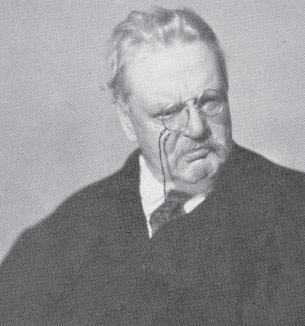


A whole new generation of readers is discovering that GK Chesterton, long thought of as just another amusing English detective novelist, is actually a towering intellect whose radically fresh views on men, women and society, based on his own common sense and Christian faith, are...
■ by Dermot QuinnLast month, autumn sharpness in the evening air, a birthday was celebrated in London. It deserves to be celebrated everywhere. At Saint Etheldreda's Church in Ely Place, a group came together from different countries and many walks of life to acknowledge the happy fact that The Chesterton Review has just turned 30. Literary jamborees are ten a penny (the London Review of Books is just out of short trousers at 25) but this one was special. Founded in 1974 by Fr Ian Boyd, a Canadian priest of legendary scholarship, the journal is one of the small glories of our time. The novelist Barbara Lucas Wall has called it "one of the best quarterly reviews, if not the best, currently in existence". Joseph Sobran, an American columnist with sharp elbows, has praised its "genius for bringing to life a whole age of modern prophets". The Princeton philosopher Robert George describes it as "a rebuke to those who think that serious writing cannot be fun to read". The plaudits are well deserved. Over the years the review has brought together writers of the calibre of Paul Johnson, Philip Jenkins, Sheridan Gille, and Garret Fitzgerald to explore not only Chesterton's world but our own. It has devoted special issues to Cardinal Manning, Christopher Dawson, New Age movements, Chesterton and Ireland, Eastern Europe in the postcommunist era. It has launched a renewed interest in its subject from Australia to Argentina, from the Balkans to the Baltic. Here is a joumal, like Chesterton himself, marvellously versatile and engaged. If you have missed it, you should give it a try.
But all of this, you might think, caters to a minority taste. Creator of a famous detective, author of some novels and plays, a poet and a philosopher, a joumalist of genius, Chesterton has become, in the popular imagination, an amiable toby jug of a man, scattering aphorism and paradox wherever he went. "I see him as one riding through life scattering largesse," Desmond McCarthy once wrote of him. "In his best poetry and prose there is the literary equivalent of that generosity of nature, of that magnanimity. I never tire of a chivalrous radiance that shines through his work."
That is true and well put. But it also medievalises a modern man. Put on a shelf, Chesterton is too often admired from a distance - cosy, unthreatening, nice. The appeal, if it still exists, is to fin de
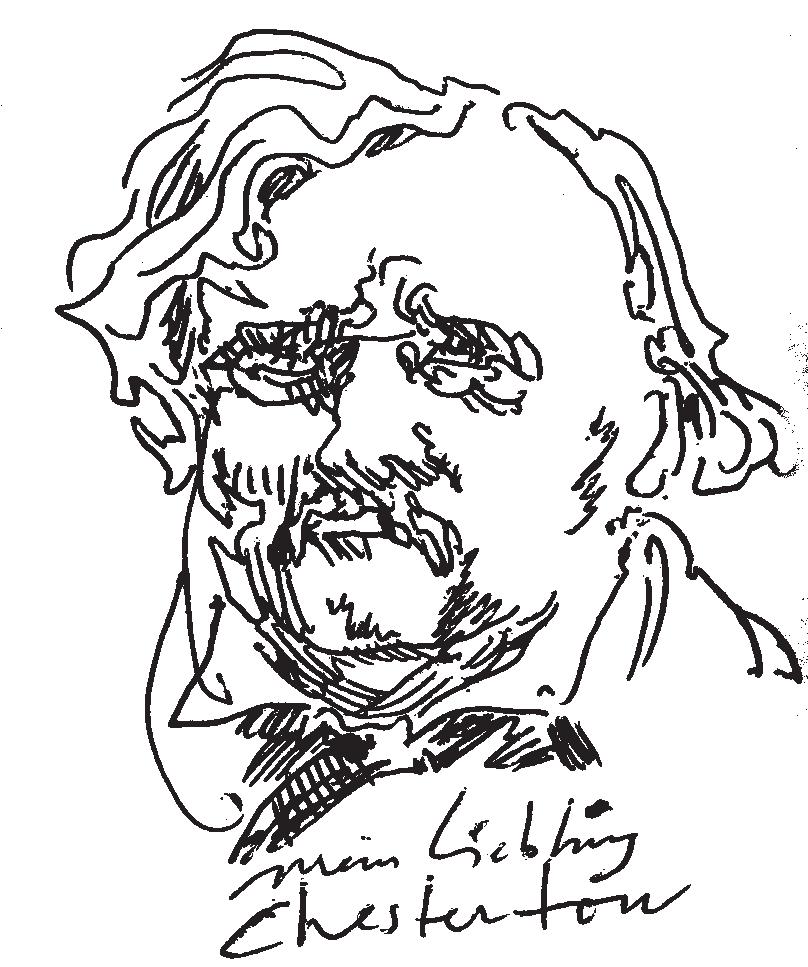
siecle types: antiquarians, nostalgiasts, browsers in second-hand bookshops. Nothing could be further from the truth. Chesterton is a strikingly contemporary figure.
What preoccupies us preoccupied him: the urgency of economic justice, the need for people-sized communities, the dangers of imperialism, the tragedy of war, the sacredness of human life from conception to natural death. Returning to England nearly 70 years after his death, he would discover a world still in need of his wisdom. That is why we need to rediscover him. That is why we need The Chesterton Review.
Take economics. Long before the "Third Way" became the talk of the town, Chesterton wrote a book called The Outline of Sanity, anticipating some of its arguments but avoiding its all-too-obvious vapidity. Current politicians could read it with profit. A plea for common sense in our commercial arrangements, and a sharp attack on monopoly capitalism,
the book put the case for small proprietorships, for independent businesses, for work on a human scale. The little shop, the family farm, the village co-operative: these were Chesterton's answers to collectivism (whether capitalist or Communist) and consumerism. The latter, he knew, had the unfortunate effect of consuming even the consumer himself. There was even an awkward name for this social vision - distributism - which spawned a popular movement even now admired throughout the developing world. "I am defending property," Chesterton said in 1933, "the essential insignia of freedom." He deplored any system in which authentic communities - the town, the neighbourhood, the family itself - were crushed by conglomerates. He urged the importance of custom, tradition, regional memory. He reposed a wonderful and exuberant trust in the common man. He hated homogeneity, loved the local. Out of touch with modern times? Hardly.
The Outline of Sanity made its point in its very title and sustained it, with wit and passion, for another 200 pages. Recent professors please copy. Their new thinking is not as new as they think.
Or take imperialism and war. Chesterton had decided views on both. A child of high Victorianism, in his prime as the Edwardian summer afternoon clouded into 1914, he lived long enough to see his country at war in Ireland, in Africa, in Afghanistan, in Iraq. Does this sound familiar? No pacifist, he warned nonetheless of the folly of empire - corrupting to the conquering power, disastrous to the conquered. He preferred his nations to be autonomous and free - Belgium, Ireland, Poland, Spain. Perhaps, you might think, he simply favoured Catholic countries. Not so. He promoted Boerdom in South Africa. Perhaps, you might equally claim, his idealised nations were not so ideal in reality. But that was not an argument against the ideal but another argument in its
favour. To fall short, after all, is at least to recognise a goal worthy of our grasp. Chesterton, once again, has words of warning to our own belligerent time.
Take, finally, human life itself. John Paul II has spoken powerfully of a "culture of death" eating at the very fabric of our late modern world. We see it so frequently and so graphically that, by now, we hardly see it at all. Abortion as a consumer right; mercy killing as a duty to the old and enfeebled (and then to the not-so-old, the not-so-enfeebled); embryos as genetic material to be used and abused, created and destroyed: that is our portion and our cup. At the heart of it, surely, is the notion of human persons as objects, not subjects; of people as instruments of social convenience; of the banquet of life to be hoarded, not shared. There will come a reckoning for this, and it will not be pretty.
Brilliantly, though, Chesterton saw this coming and warned against it. Eugenics and Other Evils, published in 1922, was prophetic then, more so now. Read it and see the dystopia of our day. Read it and see why Chesterton leads the way. The Outline of Sanity is not the only book in which he outlined sanity. He did so every time he lifted his pen.
There is reason for joy, then, at that literary birthday last month. There is reason, too, for hope. For 30 years, The Chesterton Review has kept alive a man, his work, his world, above all his vision. That vision was uniquely cheerful, grateful, generous and sane. Maurice Reckitt, Chesterton's contemporary, wrote in the opening issue of the Review that Chesterton's main message to us is that "what is most dangerous today is a surrender to the belief that life is not meaningful and hardly worth fighting for." Reginald Jebb, Hilaire Belloc's son-in-law, echoed the idea.
Commanding the first page of the first issue, he spoke of Chesterton's “fierce denunciation of injustice, his immense imaginative scope, his illuminating appreciation of everyday sights and experiences, his deep absorption in the small things of life." That was a good motto for 30 years of work. It is a good motto for our world today.
Dermot Quinn is Professor of History at Seton Hall University, New Jersey, in the US.
The Chesterton Review is published by the Chesterton Institute for Faith & Culture. It is available at $40 a year (4, issues) from The Chesterton Society, 13 Fossey St, Holder, ACT 2611.
As dusk settles, the smell of fuel permeates an abandoned warehouse on the outskirts of Rome.
The smell emanates from a generator revving up for the night to give a bit of warmth and light to the Sudanese who call this home.
“Our greatest preoccupation is our future,” said Nur Khamis, as he removed the hood of his down coat to answer questions.
“All of us want to construct a future and get out of the tunnel that we are in here,” he said in mid-December.
Sudanese asylum seekers occupied the warehouse four years ago when the city failed to provide housing for them, said Abdelazim Ali Adam Koko, a social worker at the Jesuit Refugee Service’s Pedro Arrupe Centre in Rome.
“This is a violation of human rights. At least let them live in dignity with shelter and food,” said Koko, who is also a consult-

ant for the Italian Council on Refugees.
In the occupied warehouse, sheets have been stuffed into the cracks where the walls and ceiling meet to keep out the wind, but there are some unpro-
tected spots. Like most of the 200 Sudanese here, Khamis is from the Darfur region of Sudan. The 25-year old shepherd arrived in Italy more than two years ago and immediately applied for political asylum. After being denied, he
appealed the state’s decision and is still awaiting the verdict.
“How could I go back to Sudan? The people in Darfur are suffering more every day, and my family is in an increasingly dangerous situation,” Khamis said.
He gets news on Darfur from Internet printouts taped to the warehouse walls and by talking by mobile phone with family members spread across refugee camps in Sudan and Chad.
There are an estimated 1.2 million internally displaced people within the Darfur region and 200,000 refugees in Chad, according to experts at a press conference held at Vatican Radio on December 15.
Although there are no precise figures, most Sudanese who now arrive in Italy are likely from the Darfur region, Koko said.
Like all asylum seekers, they often wait a year for the verdict on their asylum applications, he added.
With a proposed asylum law failing to pass in Parliament, Italy continues dealing with asylum procedures in a slow and often unjust way, Koko said.
“My impression is that they do not want people to ask for political asylum,” Koko said. “Italy has the instinct of copying.
Now they see other European Union countries’ policies for refu-
gees are getting worse, and they do the same.”
James Stapleton, communications officer at the Jesuit Refugee Service in Rome, blames incompetence at the helm of the Italian commission in charge of granting asylum.
“When in doubt, lawyers would give candidates the benefit of the doubt. This is not in the mind-set of decision-makers in Italy,” Stapleton said.
The commission includes representatives from the Foreign and Internal Ministries, the provincial prefect, and one UN High Commissioner for Refugees consultant without voting rights, Koko said.
Asylum seekers are not entitled to work; some sell things on the streets or pump gas illegally, Koko said.
Bahredim Bashir, a 35-year-old farmer from Darfur, is trying to learn Italian. “Without any light, it’s hard to study,” Bashir said.
“I did not think that in Europe you live as you live in the worst villages in Africa,” Bashir said.
Khamis said he is shocked by the living conditions in Italy for refugees or asylum seekers.
“I never thought that Italy was a country where you could live in an undignified way,” he commented.
Hatred and hopelessness are brewing in Darfur as unrelenting violence still enflames western Sudan, according to Caritas Internationalis.
“Darfur is a tinderbox of war,
dread and very little hope,” according to a report released on December 20 by Caritas, the Vatican-based global confederation of Catholic social service and development organisations.
“Reports of armed clashes throughout the region continue to mount, fueling concerns that whatever humanitarian progress has been made faced new threats and potential obstacles,” the report warned.
Caritas Internationalis has joined forces with Action by
Churches Together International in its emergency response to the humanitarian crisis in Darfur.
In a joint ecumenical appeal, Caritas is working to provide shelter, water, sanitation and cooking materials to 500,000 displaced people in southern and western Darfur.
At least 1.2 million people have been forced to flee their homes in the almost two years of fighting among rebels, the Sudanese army and Arab militia groups.
Hundreds of thousands of
people are living in overcrowded camps in Sudan and neighboring Chad.
Reporting on conditions in a camp near the city of Garsilla, in western Darfur, Caritas said violence continues to haunt refugees, especially women.
Women risk sexual assault and violence by roaming militias every time they leave the camps to collect firewood needed for fuel, the report said. Rape is “a problem on a daily basis,” a humanitarian worker told Caritas.
Human rights groups claim Arab militia backed by the Sudanese government are waging a terror campaign against black Africans in order to push them from their lands in Darfur.
Deprived of their land and livelihoods, some families said they feel trapped inside the encampments, unable to leave for fear of attacks from militias on the outside.
“We are just like hens in cages,” a refugee told Caritas.
False reports of conversions and reconversions; ongoing violence; and threats of counter-festivals at Christmas are among the ongoing problems Christians face in some states of India.
Catholic authorities in the eastern state of Orissa have appealed to the central government to halt the anti-Christian campaign launched by Hindu fundamentalists, police, and local media.
On Wednesday, the Times of India reported that three Christians were attacked after having been suspected of converting some villagers in Gopinath, in the Balasore district. The same day, the police reported that a man was attacked by some Christians because he refused to change his creed.
Such contradictory accounts are part of a trend targeting “conversions,” said AsiaNews, an agency of the Pontifical Institute for Foreign Missions.
Bishop Thomas Thiruthalil of Balasore told AsiaNews that the issue of conversions is “an easy instrument in the hands of groups and fringe extremists who want to ignite social hatred.”
“Anti-social elements are taking advantage of the Orissa Freedom of Religion Act, to intimidate tribals with the knowledge and consent of
the local administration,” he said.
The Freedom of Religion Act bans all forced conversions, but the law is frequently used to threaten the tribals.
The prelate, who is also chairman of the Orissa Bishops’ Regional Council, turned to India’s interior minister to find a solution.
For his part, John Dayal, president of the All Indian Catholic Union, an organisation representing 16 million faithful, warned that the news about conversions to Christianity is frequently invented by fundamen-
talists - though the violence against Christians is all too real.
The issue of conversions provokes opposition in various Indian states.
The ruling Bharatiya Janata Party governs the state of Orissa, one of those with the greatest presence of Hindu fundamentalists. The BJP promotes a one-religion, ideological nationalism and is supported by fundamentalist movements that oppose the Catholic Church’s work in social services and development. - ZENIT

John Paul II presented the Eucharist as the sacrament in which the Son of God remains joined to humanity “with its burden of trials and troubles.”
The Pope managed to preside at the long Christmas Eve Midnight Mass in St. Peter’s Basilica, joined by 30 cardinals. The Mass was televised to about 70 countries.
At Christmas in this Year of the Eucharist, the Holy Father dedicated his homily to underline the intimate bond between the sacrament of the real presence of Christ, and the birth of Jesus two millenniums ago.
“Bethlehem! The city where Jesus was born in fulfillment of the Scriptures, in Hebrew means ‘house of bread,’” John Paul II said. “It was there that the Messiah was to be born, the One who would say of himself: ‘I am the bread of life.’
“In Bethlehem was born the One who, under the sign of broken bread, would leave us the memorial of his Pasch. On this holy night, adoration of the Child Jesus becomes Eucharistic adoration.”
“We adore you, Lord, truly present in the Sacrament of the Altar, the living Bread which gives life to humanity,” the Pope added in a homily that was shorter than those of past Christmas Eves. “We acknowledge you as our one God, a little Child lying helpless in the manger!”
“You are born on this Night, our divine Redeemer, and, in our journey along the paths of time, you become for us the food of eternal life,” he said. “All humanity, with its burden of trials and troubles, stands in need of you.”
He added: “Stay with us, living Bread which came down from heaven for our salvation! Stay with us forever!”
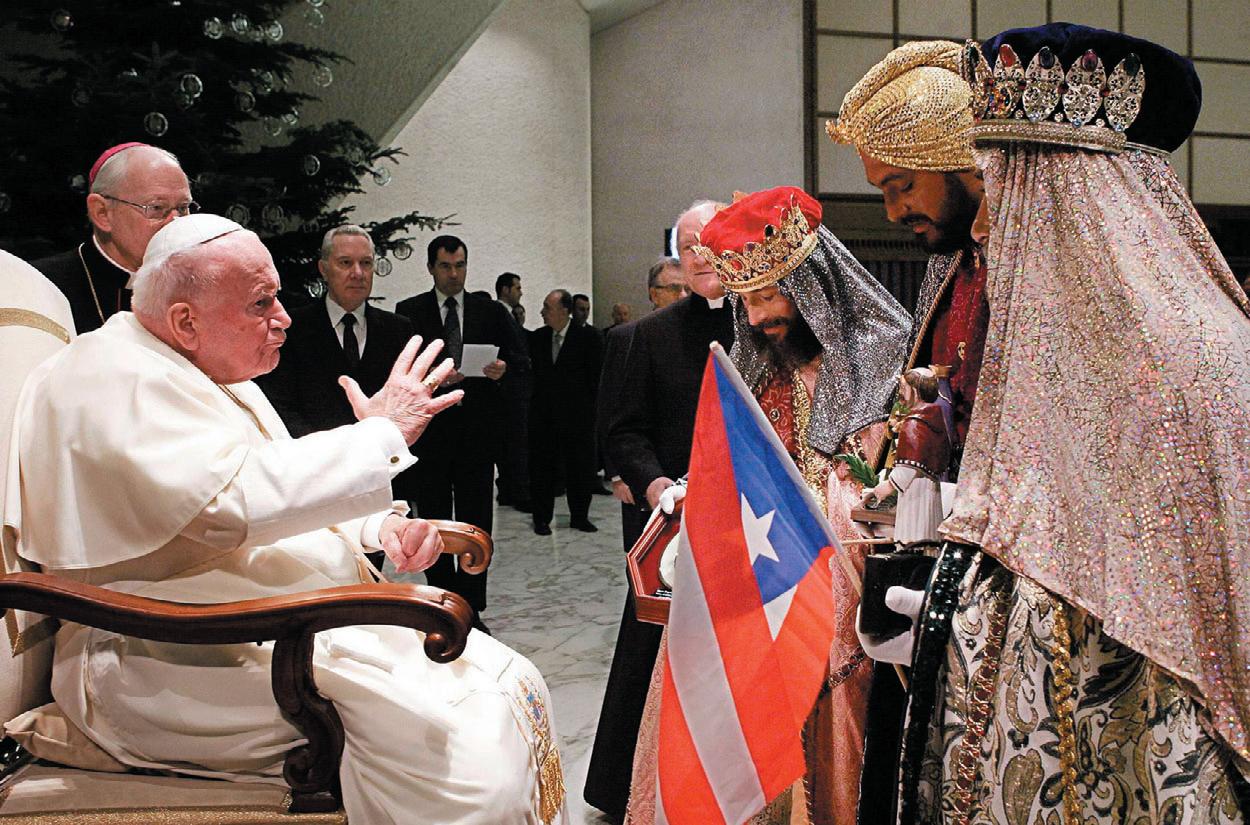
John Paul II makes a Christmas Plea for Peace on Earth with special mention of Iraq, Holy Land
John Paul II made a strong plea to the Infant Jesus for peace on earth, as the Holy Father observed the 27th Christmas of his pontificate.
The Pope read his traditional noontide Christmas Day message prior to imparting his blessing to Rome and to the world, before thousands gathered in St Peter’s Square under rainy skies.
His words were broadcast to 72 countries, including Muslim
nations - Turkey, Morocco, Algeria and Indonesia.
The Holy Father, who had celebrated Midnight Mass, gave his greeting in 62 languages, including Hebrew and Arabic. After his greeting in Chinese, he raised his glance, as if expecting a response.
“Babe of Bethlehem, Prophet of peace,” he implored in his message, “encourage attempts to promote dialogue and reconciliation, sustain the efforts to build peace, which hesitantly, yet not without hope, are being made to bring about a more tranquil present and future for so many of our brothers and sisters in the world.”
“I think of Africa, of the tragedy of Darfur in Sudan, of Côte d’Ivoire and of the Great Lakes Region,” the Pope said. “With great apprehen-
sion I follow the situation in Iraq. And how can I fail to look with anxious concern, but also invincible confidence, towards that Land of which you are a son?
“Everywhere peace is needed!
You, Prince of true peace, help us to understand that the only way to build peace is to flee in horror from evil, and to pursue goodness with courage and perseverance.”
“Men and women of good will, of every people on the earth, come with trust to the crib of the Saviour!” the Holy Father exhorted.
“Hasten to meet him; he comes to teach us the way of truth, peace and love.”
John Paul II spoke for more than a half-hour. On January 1 he is scheduled to preside at a Mass on World Day for Peace. -ZENIT
Leftist guerrillas shot and killed a parish priest in a jungle area of northwest Colombia, Reuters reported. Father Javier Francisco Montoya, 45, died at the hands of the Revolutionary Armed Forces of Colombia (FARC) in the province of Choco earlier this month, a bishop said today.
“The guerrillas said they shot him and will not give us his body because they buried him,’’ Bishop Alonso Llano, 73, of Istmina-Tado told reporters, without giving any reason for the killing. The FARC sometimes sees religious authorities as a challenge to its ability to govern areas it controls.
Several thousand pilgrims flocked to the traditional birthplace of Jesus on Christmas Eve -- crowds that were bigger than in the past few years.
Christian worshippers made their way to Manger Square, next to the Church of the Nativity, on Friday. Latin Patriarch Michel Sabbah of Jerusalem celebrated Midnight Mass in the adjacent St. Catherine’s Church. Hundreds of people packed the church, the Associated Press reported.
With interim Palestinian leader Mahmoud Abbas and other dignitaries in attendance, Patriarch Sabbah called on Israelis and Palestinians to put the violence of the past behind them, AP said.
- ZENITThis is the 21st Christmas that president of the Pontifical Council for Social Communications, Archbishop John Foley, is celebrating in Rome. One of his duties over these years has been to give the commentary for the live broadcast for the Midnight Mass with John Paul II. For the American Archbishop, the Christmas Eve Mass is one of the Vatican’s standout celebrations. “I consider it a great privilege to do the commentary because it’s a marvelous work of evangelisation,” he says.
‘Dear Lord, you’ve given me everything I have - my life, my family, my faith. You’ve been so good to me and I’d like to give it all back to you.’
Not only is the broadcast reaching Catholics, he says, “but, there’s also an opportunity for others around the world who are watching casually, maybe even by accident, to understand what Catholics believe; why we believe it; why we worship in the way we do.”
Archbishop Foley points out
that it is a time where many gain answers to their question “What is so wonderful about the Christian faith that more than 2 billion people in the world consider themselves Christians? - with more than 1 billion considering themselves Catholic Christians, united in one Church, under the Vicar of Christ, our Holy Father, Pope John Paul II, the successor of Peter.”
The Archbishop spoke about how John Paul II has influenced the celebration of Christmas in the Holy See.
“The Holy Father wanted to have the Christmas crib there so that families could come with their children and explain the story of the Nativity to them,” he says.
“Each year a new type of
Christmas Crib scene is constructed in St. Peter’s and unveiled on Christmas Eve and is left until February 2, the feast of the presentation of the Child Jesus in the Temple.” As the Crib serves as a powerful reminder of the season’s meaning, it certainly impacted the life of this Vatican official who considers Christmas as the anniversary of his priestly vocation.
“It was Christmas Day in my senior year of high school. I went back to my parish church after Christmas dinner and I knelt in front of the Crib and the church was otherwise completely empty at that time.
“I said, ‘Dear Lord, you’ve given me everything I have - my life, my family, my faith. You’ve been so
good to me and I’d like to give it all back to you.’”
Fifty years later, Archbishop Foley has a chance, along with others from the Roman Curia and visitors to Rome, to contemplate the celebration in St Peter’s Square, not just in front of the Crib but also by the enormous Christmas tree.
“On Christmas Day, the Holy Father usually invites his Polish bishop friends who are here in Rome to have a traditional Christmas dinner, with him so that he can relax on after a very taxing program in which he would have had the Christmas Midnight Mass and then with his greetings in about 60 languages, together with the Christmas message.”
- ZENITActor Kevin Spacey’s long-gestating Bobby Darin biography finally sees the light of day, with the actor confidently stepping into the late singer’s shoes and delivering a phenomenal vocal performance that should surprise many.
In “Beyond the Sea”, which he also produced, directed and cowrote, Spacey confronts head-on any charges that at 44 he’s too old to play Darin (who died at 36) by framing the narrative as if Darin, at the end of his career, is filming the story of his own life, with the help of his younger self (William Ullrich). Ullrich recently played the younger Antonio Banderas in the Broadway production of “Nine,” which was based on Fellini’s “8 1/2” which in turn Spacey has claimed was a model for his screenplay.
The story begins with the young Walden Robert Cassotto, stricken with rheumatic fever, being cared for by his mother, Polly (Brenda Blethyn). Walden will later become known to the world as Bobby Darin.
Darin hears the doctor tell Polly that his heart has been damaged and that he’ll “be lucky to see” his 15th birthday, a prediction that haunts him throughout his life.
Polly, a former vaudeville perfomer, helps ease his recuperation with music and as he shows a talent for it she encourages him in his career. A big production number with Spacey, Blethyn and
Delightfully macabre tale of three orphans - one an infant - navigating their perilous way through various guardians into whose dubious care they’ve been entrusted after the death of their parents: evil Count Olaf (Jim Carrey) who has an eye on their fortune; kindly but dimwitted Uncle Monty (Billy Connolly); and hyperphobic Aunt Josephine (Meryl Streep) who lives in a house perched high on a cliff. Director Brad Silberling’s adaptation of three books by Lemony Snicket (aka Daniel Handler;

the large chorus dancing on the city street is the first indicator that, besides the actual “performance” numbers with Darin onstage, there will be fantasy numbers, as in a real musical.
Polly witnesses the success of his early hits like “Splish Splash” and “Mack the Knife” but dies before he begins his movie career. While filming a Rock Hudson film in Italy, he falls madly in love with Sandra Dee (Kate Bosworth), who treats him coolly and is under the thumb of a domineering mother (Greta Scacchi).
Darin charms her, though, and proposes. In spite of the enraged mother, they marry. Not surpris-
ingly Dee cannot simply shrug off the overbearing maternal influence and on her wedding night is a mass of nerves. In a sweet scene, Darin promises her he’ll stay on his side of the bed for as long as she wants, and that “crossing over” will be her decision. She succumbs to his lowkey, sincere approach. From this point on, the film becomes much more compelling.
Darin’s fast career-track strains the marriage, even after their son Dodd is born.
Dee begins to drink excessively, brought on by the stresses of their twin careers. His career flourishes with Darin’s older sister, Nina (Caroline Aaron), in frequent

here voiced by Jude Law) makes for excellent family viewing for all but perhaps the very youngest children who might find some of the situations scary, though the action is played humorously tongue-in-cheek throughout. Some mildly intense situations and a smattering of crude language.
The USCCB Office for Film & Broadcasting classification is A-II - adults and adolescents.
Dark-edged drama about a cranky old-school trainer and manager (Clint Eastwood) who finds personal redemption in molding a scrappy but determined female boxer (Hilary Swank) into a contender, only to have his efforts implode in tragedy. What seems
solid singing voice, amazingly like Darin’s. Impressive as Jamie Foxx’s assumption of Ray Charles was in “Ray,” Spacey’s achievement is all the more remarkable for doing his own singing. Dramatically, he’s fine, too, especially once the plot gets going, but you never quite forget you’re watching Spacey, not Darin.
All the musical numbers are slickly done, and the elaborate fantasy sequences, as when he romances Dee with the catchy title song, work well, too.
In spite of some knock-down, drag-out fights, the bond between Darin and Dee is portrayed as strong and loving, reinforced by their mutual love of their son (the film conveniently ignores their real-life divorce, but a written postscript to the film informs us that Dee loves Darin to this day, and never remarried).
attendance, along with Nina’s husband, Charlie (Bob Hoskins), who eventually becomes Darin’s protector. As time passes, Darin attempts to modify his musical style to include folk and anti-war songs. On the personal front, he receives a shattering revelation about his parentage and the assassination of Robert Kennedy deals him a heavy blow, as he also copes with increasing heart-related health problems.
Spacey does, at first, seem a tad mature for the image of the smoothfaced young Darin, but from the first notes of his opening song, the vocal impersonation is stunningly good, with Spacey projecting a
Spacey’s direction is assured, the production design handsome, and he’s drawn fine performances from Hoskins, Blethyn and John Goodman (as his agent). Up-andcoming jazz pianist/singer Peter Cincotti has a small supporting role as Darin’s friend and pianist.
Dramatically, the story is flawed, but musically - and there are plenty of songs - “Beyond the Sea” is a high from beginning to end. It’s a triumph for the multifaceted Spacey, whose versatility matches that of his beloved subject.
The film contains some rough and profane language and one nonexplicit sexual encounter. The USCCB Office for Film & Broadcasting classification is A-III - adults.
like a Rockyesque fight film takes a disturbingly downbeat turn, becoming a sombre meditation on assisted suicide with a morally problematic ending which, despite knockout performances by Eastwood (who also directed), Swank and Morgan Freeman, will leave Catholic viewers who are conscious of the deeper complexities and significance of the issue unsatisfied with another Hollywood treatment. A guiltwracked, but ultimately permissive, depiction of euthanasia, much bloody boxing violence, some rough and crude language and profanity. The USCCB Office for Film & Broadcasting classification is O - morally offensive. All of which leads to...
...A dramatisation of the life and assisted suicide of Spanish poet Ramon Sampedro (Javier Bardem), tragically paralysed in a freak diving accident, and who fought a losing 30-year legal bat-
tle for the right to end his own life, focusing on his relationships with three women: a terminally ill lawyer (Belen Rueda) hired to help with his case, his dedicated sister-in-law and caretaker (Mabel Rivera), and a lonely single mother (Lola Duenas) with whom he bonds. Soberly crafted with a tour-de-force performance by Bardem, dreamlike visuals and sprinkles of humour, the complex film raises profound moral questions concerning death, dignity, the sanctity of human life and personal autonomy, and provides an impassioned voice for both sides of the issue. But many will undoubtedly see the movie as little more than a gilded defence of assisted suicide, especially given its morally problematic ending. A sympathetic view of euthanasia, and some brief mild sensuality. The USCCB Office for Film & Broadcasting classification is O - morally offensive.
30 December, 2004, The Record
Classified ads: $3.30 per line inc GST 24 hour Hotline: 9227 7778
■ BRICK RE-POINTING
Phone Nigel 9242 2952
■ GUTTERS/DOWNPIPES
Need renewing, best work and cheapest prices. Free quote. Ph: Ad 9447 7475 or 0408 955 991 5008.
■ PICASSO PAINTING
Top service. Phone 9345 0557, fax 9345 0505.
■ PERROTT PAINTING PTY LTD
For all your residential, commercial painting requirements. Phone Tom Perrott 9444 1200.
■ ALL AREAS
Mike Murphy 0416 226 434.
■ WORK FROM HOME
Around your children & family commitments. My business is expanding and I need people to open new areas all over Australia. Training given. Highly lucrative. www.cyber-success-4u.org
■ DUNSBOROUGH
b/front, spec views across bay, pool, close to shops, sleeps 8 in comfort, Ph 0408 904 862
■ SUCCEED FROM HOME
Call Christine on Tel: 9256 2895
Deadline: 5pm Tuesday
■ THE HUMBLE MESSENGER
9225 7199. Shop 16/80 Barrack St (inside Bon Marche arcade), Perth.
THANK YOU
■ THANK YOU
To St Jude for prayers answered. M.R.
Classifieds 9227 7778
email: administration@ therecord.com.au
10. May I offer you a light for that votive candle?
9. Hi there, my friend and I were wondering if you would settle a dispute we're having. Do you think the word should be pronounced 'HOMEschooling' or 'Home SCHOOLing?'
8. Sorry, but I couldn't help but noticing how cute you look in that ankle-length, shapeless, plaid jumper.
7. What's a nice girl like you doing at a First Saturday Rosary Cenacle like this?
6. You don't like the culture of death either? Wow! We have so much in common!
5. Let's get out of here. I know a much cozier little Catholic book store down the street.
4. I bet I can guess your Confirmation name
3. You've got stunning scapular-brown eyes
2. Did you feel what I felt when we reached into the holy water font at the same time?
1. Confess here often?
Sunday January 2
ETERNAL WORD TELEVISION NETWORK
1 - 2 pm on Access 31: Mother of God
Documentary: The Footprint of God: Salvation from Abraham to Augustine (Global Showcase). Please let your family and friends know about EWTN programs on Access 31. Whenever you will miss a program, remember to record it to view later. We also have a wonderful selection of videos, available on request. Postal address: The Rosary Christian Tutorial Association, PO Box 1270, Booragoon 6954. Enq: 9330 1170
Sunday January 2
FUNDRAISING DINNER CHANGE OF VENUE
The Franciscans of the Immaculate wish to advise that due to unforseen circumstances the venue for the fundraising dinner has now been changed to Vasto Club Casa D’Abruzzo, 1 Vasto Place, Balcatta. Any inconvenience caused is deeply regretted.
Monday January 3
NORTHERN SUBURBS MENTAL HEALTH
SUPPORT GROUP
Meets the first Monday of every month at Our Lady of the Mission Parish Centre 270 Camberwarra
Andrew Lloyd Webber’s “The Phantom of the Opera” (Warner Bros.) finally reaches the screen after 18 years, in the hands of director Joel Schumacher, who has crafted a faithful and eye-filling re-creation of the worldwide stage hit.
The opening scene is an auction of artifacts from an opera house in Paris many years after the main events of the story. The unveiling of the “famous chandelier” and its lifting back to the ceiling in restored splendor is a dazzling cinematic moment, as the opera house is transformed bit by bit from the misty black and white of the present scene to the glorious color of the past.
The rest of the film doesn’t quite live up to that grand beginning, but remains mostly absorbing, in spite of unremarkable leads and unconvincing lip-syncing that undermine some of the drama.
The plot will be well-known to fans of the show and the Lon Chaney film version. The time is 1870, and the theater is in the clutches of a disfigured masked Phantom (Gerard Butler) who demands that Box 5
Drive Craigie 7.30 - 9pm. Contact: Donna Moxey 9447 8223.
Friday January 7
PRO-LIFE PROCESSION MIDLAND
The First Friday Mass, procession and rosary vigil will commence at 9.30am with Mass celebrated at St Brigid’s Church Midland. The Franciscan Friars of the Immaculate will lead us. All are invited to witness for the sanctity of life and pray for the conversion of hearts. Enq: Helen 9402 0349
Saturday January 8
DAY WITH MARY
Our Lady of the Mission, 270 Camberwarra Drive Craigie 9am – 5pm. A video on Fatima will be shown at 9am. A day of prayer and instruction based upon the messages of Fatima. Includes Sacrament of Penance, Holy Mass, Eucharistic Adoration, sermons, rosaries, Procession of the Blessed Sacrament and Stations of the Cross. Please BYO. Enq: Franciscan Friars of the Immaculate 9384 3311.
Friday January 21
NEW AND DIVINE HOLINESS PRAYER GROUP
All night Eucharistic vigil at St. Bernadette’s

always be kept vacant, and a salary be paid to him monthly. When the action begins, a new management team (Simon Callow and Ciaran Hinds) takes over from a director who is only too glad to flee the spooky proceedings. Christine Daae (Emmy Rossum), an impressionable young soprano, is being coached by a mysterious disembodied voice
Church, Jugan Street, Glendalough commencing 9pm. Readings and reflections on the Hours of the Passion of Our Lord Jesus Christ with hourly rosaries and hymns. Concludes Saturday morning with Parish Mass at 7.30am followed by Rosary and Benediction. All welcome. Enq: 9444 6131.
Sunday January 23
FUNDRAISER FOR CROSS ROADS COMMUNITY
Portuguese Sardine Festival is being held at St Jerome’s in Spearwood at 1pm. Please ring CRC on 9319 8344 for information.
Acts 2 College of Mission & Evangelisation Enrolments are now open for 2005. An exciting opportunity to grow in knowledge of the Bible and Catholic doctrine, to deepen your faith, and apply it in everyday life. Ring 9202 6868 or visit the website at www.acts2come.disciplesofjesus.org
SEPERATED, DIVORCED, WIDOWED
The Beginning Experience is running Coping programs to assist people in learning to close the door gently on a relationship that has ended in order to get on with living. The next courses will commence
which she assumes is the ghost of her late beloved father. In fact, it is the Phantom, who sings to her from behind the mirror in her dressing room.
Raoul, Vicomte de Chagny (Patrick Wilson), is introduced to the company as their new patron, and he recognizes Christine as his childhood companion.
The Phantom contrives to get temperamental diva Carlotta (Minnie Driver) removed from the opera, and Christine installed in her place. Christine indeed goes on in Carlotta’s stead and meets with acclaim.
After her triumph, Christine and Raoul have their tender reunion, but later, the Phantom emerges from the mirror, and lures the transfixed Christine to his underground lair. After he serenades her with the show’s most famous song, “The Music of the Night,” she can’t resist pulling off his mask, which unleashes his fury. (The compassionate Christine registers only the barest look of horror.)
Butler’s mask covers only about a quarter of his face, and since otherwise he looks so strikingly handsome the mask seems little more than a fashion statement.
Christine is eventually restored to the outside world where her romance with Raoul blossoms, while the Phantom listens with hurt envy.As the story progresses, there’s murder, and the famous severing of the chandelier, before the film reaches its action-packed conclusion.
Schumacher has given the Phantom more
on January 8 & 15 in Busselton and January 22 & 29 in Perth. Enq: Bev 9315 9303 (Perth) or Audrey 9752 4139 (Busselton).
CROSS ROADS COMMUNITY
Term 4 – 18th October to 17th December for:
Family & Friends Support Groups of Substance
Abusers on Wednesdays 7pm – 9pm, Substance
Abusers Support Groups on Tuesdays 5.30pm – 7.30pm & Friday’s All day Group for Substance
Abusers 9.30am – 2pm, Bible Night: Tuesdays 7pm – 9pm & Healing Mass: Fridays 12.30pm. Healing Masses: 1st Monday of month 7pm Church of East Fremantle, 2nd Monday of month 10am St Jerome’s Munster. No Healing Masses in January 2005.
ALL NIGHT VIGIL ADORATION
First Firday and first Satufday devotions to the Sacred and Immaculate Herats at All Saints Chapel in Allendale Square, Perth, commencing mass 9pm on Friday with Rosaries, Hymns with concludingt Mass 7am Saturday. Contact Colin 9409-4543
of a back story -- he was a prisoner in a circus sideshow, who finally killed his keeper and escaped, with the aid of Madame Giry (Miranda Richardson), now the ballet mistress.
The romance is given prominence over the terrifying aspects of the story, so as a thriller it’s not very gripping.
Butler’s vocals sound rather like the show’s first Phantom, Michael Crawford, and he acts with intensity, particularly toward the end of the film, but the tortured Byronic hero approach foisted on him seems wrongheaded.
Rossum has a sweet, period look to her, but her emotions are mostly limited to a dolefully sympathetic expression, and her lip-syncing is particularly poor. Wilson is saddled with an unfortunate wig, and fails to do much with his cardboard character, though he looks imposing in his old-age makeup.
The production design is gorgeous, with splendid attention to detail, and Schumacher has created a very believable backstage environment for the story to play out.
In spite of some longueurs, the film is quite entertaining, and joins the Chaney version as the most faithful onscreen telling of Gaston Leroux’s original novel.
This film contains fleeting rear nudity by a background extra, a few coarse words and some violence.
The USCCB Office for Film & Broadcasting classification is A-II -- adults and adolescents.
The theme for this year's Summer School, run by Perth's Disciples of Jesus community, is aimed at those who experience a yearning for spirituality. The Summer School will be held from 9-16 January in Bunbury. Dwayne Rota, who attended Summer School 2004, says it was the best thing he has done so far.
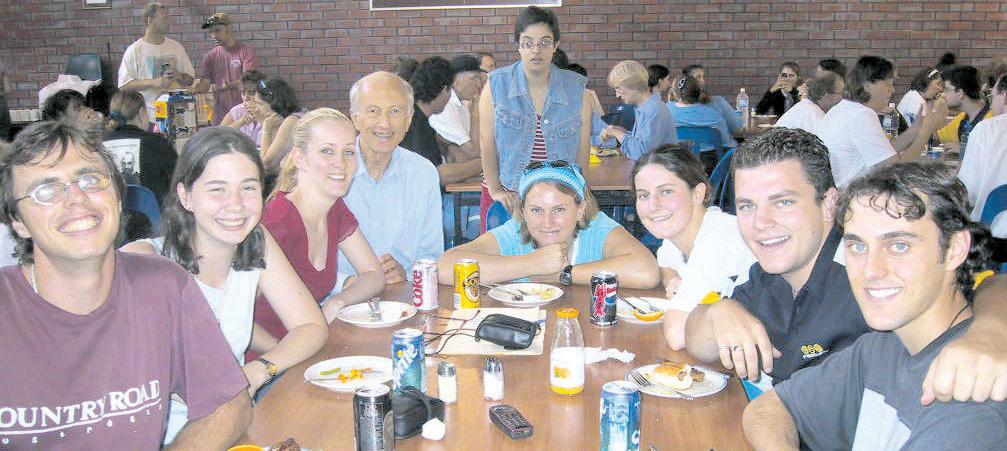
When I first experienced Summer School it changed my life for, well, eternity I hope. So, when I was asked to lead the administration for the 2005 Summer School, I was quick to say “yes”. The theme, ‘Come to the waters all you who are thirsty’ taken from Isaiah is quite a fitting one for me.
Before attending my first Summer School, my journey and growth in faith were far from obvious. I led a life of selfishness and indifference to others. I found my inner-self literally screaming to get out of that type of life, to fly away, but I was constantly pulled back into it. Afraid to let go of what seemed so comfortable, I finally reached out to God, ever so briefly, yet infinitely long enough for Him to make changes in my life possible, I ended up here, typing this testimony to His Glory.
Summer School came about eight months after conversion through a ‘Life in the Spirit’ seminar hosted by the Disciples of Jesus. I felt like such an infant in my faith, and in every way acted as one too. My thirst for the truth was unquenchable. Luckily, I was given lots of books to read by
all kinds of wonderful people who wanted to assist me in my growth spurt.
The trouble was, I wasn’t much of a reader. But I continued my journey with Christ and joined the Community. Some time later, I heard about the Summer School 2004. I really didn’t know much about it and didn’t inquire too much either. It just felt like something that would be good to do, so I signed up for it. However I was impressed to discover that each person who registered received a dedicated “prayer buddy”. This person was someone you didn’t know, but who would pray for you in the time leading up to the school and then during it.
Upon arrival at Bunbury Cathedral Grammar School, we were greeted and provided with information packs and accommodation details. Everything had been well organised, including the transportation arrangements. The dorms were very clean with big bathrooms and showers and cosy beds. I shared a room and lots of late night discussions with a friend, who has become like a brother to me since.
The next morning came early. I wanted to attend the daily early-
morning Eucharistic Adoration and participate in Morning Prayer. A continental style breakfast followed and we took pleasure in serving and helping each other. Then came time to choose which seminars to attend. This wasn’t such an easy task because of the wide range of choices. My spiritual thirst was becoming more pronounced.
One attraction was that each seminar had topics for varied levels of spiritual complexity and maturity, so a barbarian like me would not be discouraged by the more philosophical subjects being offered. I finally picked my topics.
The morning session consisted of seminars, coffee time, and small group sharing, followed by Mass and then lunch. The afternoon consisted of another seminar, a few quick chores, and free time for recreation, Eucharistic Adoration, or the most peaceful Gospel-led rosary walk with Father Hugh Thomas CSSR and Father Anthony Van Dyke OP.
I found that the week’s program filled my soul as if it were a sponge, and I couldn’t get enough. Discussion and interaction were encouraged and sought out. The lectures and the priests were ‘top notch,’ keeping
everyone focussed on the subjects at hand.
Evening sessions, meanwhile, were well-organised and the music was beautiful. The musicians were extremely talented. A heart-felt, impromptu sharing would typically come next, followed by an inspiring talk. This would be concluded with more prayer and music to reflect on the talk. Each night, the power of the Holy Spirit was obvious; I felt that I could sense the wonder of His work. Gently, and patiently, night by night I experienced His presence.
From the youngest to the oldest, the Lord broke the hearts of stone and revealed His Love and His Truth. People of all levels of spirituality were experiencing the life-changing love and mercy of God.
If I had to pick the most significant thing that happened to me on the 2004 Summer School I would say that I found the Father’s love revealed to me in a very special and personal way. It was what I needed. It was the realisation of the steadfast, endless, and always-present love of God. No matter what, I was secure with Him. This gift, this joy …. is above any joy the world could ever give. So my thirst continues, praise
God! And so, then, does my journey. I pray and hope that you too may come to the 2005 Summer School at Bunbury from 9-16 January. I would be happy to provide any information or answer any questions you might have.
Dwayne Rota can be contacted on 0417 175 128. Alternatively, the Disciples of Jesus number is (08) 9202 6868. The Summer School website can be found on the Internet at: www.sse2005.disciplesofjesus.org
